This is an old revision of this page, as edited by 184.74.191.181 (talk) at 20:03, 26 November 2019 (→Administrative divisions: Changed "Nigeria has eight cities with a population of over 1 million" to "five cities", since the list and the table are both for five cities.). The present address (URL) is a permanent link to this revision, which may differ significantly from the current revision.
Revision as of 20:03, 26 November 2019 by 184.74.191.181 (talk) (→Administrative divisions: Changed "Nigeria has eight cities with a population of over 1 million" to "five cities", since the list and the table are both for five cities.)(diff) ← Previous revision | Latest revision (diff) | Newer revision → (diff) This article is about the country. For other uses, see Nigeria (disambiguation). Not to be confused with the neighbouring Francophone country Niger. Federal republic in West Africa
| Federal Republic of Nigeria | |
|---|---|
 Flag
Flag
 Coat of arms
Coat of arms
| |
| Motto: "Unity and Faith, Peace and Progress" | |
| Anthem: "Arise, O Compatriots" | |
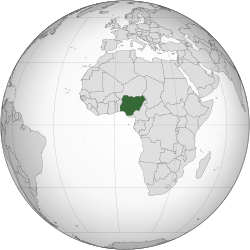 | |
| Capital | Abuja 9°4′N 7°29′E / 9.067°N 7.483°E / 9.067; 7.483 |
| Largest city | Lagos 6°27′N 3°23′E / 6.450°N 3.383°E / 6.450; 3.383 |
| Official languages | English |
| Major languages | |
| Other languages | Berom |
| Religion | See Religion in Nigeria Broadly speaking, the number of Muslims and Christians is about equal and together make up around 90% of religious believers. |
| Demonym(s) | Nigerian |
| Government | Federal presidential constitutional republic |
| • President | Muhammadu Buhari |
| • Vice President | Yemi Osinbajo |
| • Senate President | Ahmed Ibrahim Lawan |
| • House Speaker | Femi Gbajabiamila |
| • Chief Justice | Justice Ibrahim Tanko Muhammad |
| Legislature | National Assembly |
| • Upper house | Senate |
| • Lower house | House of Representatives |
| Independence from the United Kingdom | |
| • Unification of Southern and Northern Nigeria | 1914 |
| • Declared and recognised | 1 October 1960 |
| • Republic declared | 1 October 1963 |
| • Current constitution | 29 May 1999 |
| Area | |
| • Total | 923,768 km (356,669 sq mi) (32nd) |
| • Water (%) | 1.4 |
| Population | |
| • 2019 estimate | 200,962,417 (7th) |
| • 2006 census | 140,431,790 |
| • Density | 215/km (556.8/sq mi) (65th) |
| GDP (PPP) | 2019 estimate |
| • Total | $1.221 trillion (23rd) |
| • Per capita | $6,130 (129th) |
| GDP (nominal) | 2019 estimate |
| • Total | $447.013 billion (31st) |
| • Per capita | $2,244 (137th) |
| Gini (2010) | medium inequality |
| HDI (2017) | low (157th) |
| Currency | Naira (₦) (NGN) |
| Time zone | UTC+01:00 (WAT) |
| Drives on | Right |
| Calling code | +234 |
| ISO 3166 code | NG |
| Internet TLD | .ng |
Nigeria (/naɪˈdʒɪəriə/ ), officially the Federal Republic of Nigeria, is a country in West Africa, bordering Niger in the north, Chad in the northeast, Cameroon in the east, and Benin in the west. Its coast in the south is located on the Gulf of Guinea in the Atlantic Ocean. The federation comprises 36 states and 1 Federal Capital Territory, where the capital, Abuja, is located. The constitution defines Nigeria as a democratic secular state.
Nigeria has been home to a number of ancient and indigenous kingdoms and states over the millennia. The modern state originated from British colonial rule beginning in the 19th century, and took its present territorial shape with the merging of the Southern Nigeria Protectorate and Northern Nigeria Protectorate in 1914. The British set up administrative and legal structures while practising indirect rule through traditional chiefdoms. Nigeria became a formally independent federation in 1960. It experienced a civil war from 1967 to 1970. It thereafter alternated between democratically elected civilian governments and military dictatorships until it achieved a stable democracy in 1999, with the 2011 presidential election considered the first to be reasonably free and fair.
Nigeria is often referred to as the "Giant of Africa", owing to its large population and economy. With 213 million inhabitants, Nigeria is the most populous country in Africa and the seventh most populous country in the world. Nigeria has the third-largest youth population in the world, after India and China, with more than 90 million of its population under age 18. The country is viewed as a multinational state as it is inhabited by 250 ethnic groups, of which the three largest are the Hausa, Igbo and Yoruba; these ethnic groups speak over 500 different native languages and are identified with a wide variety of cultures. The official language of Nigeria is Nigerian English, chosen to facilitate linguistic unity at the national level. Nigeria is divided roughly in half between Christians, who live mostly in the southern part of the country, and Muslims, who live mostly in the north. A minority of the population practice religions indigenous to Nigeria, such as those native to the Igbo and Yoruba ethnicities.
Nigeria is the world's 20th largest economy as of 2015, worth more than $500 billion and $1 trillion in terms of nominal GDP and purchasing power parity, respectively. It overtook South Africa to become Africa's largest economy in 2014. The 2013 debt-to-GDP ratio was 11 percent. Nigeria is considered to be an emerging market by the World Bank; it has been identified as a regional power on the African continent, a middle power in international affairs, and has also been identified as an emerging global power. However, it currently has a "low" Human Development Index, ranking 152nd in the world. Nigeria is a member of the MINT group of countries, which are widely seen as the globe's next "BRIC-like" economies. It is also listed among the "Next Eleven" economies set to become among the biggest in the world. Nigeria is a founding member of the African Union and a member of many other international organizations, including the United Nations, the Commonwealth of Nations and OPEC.
Etymology
The name Nigeria was taken from the Niger River running through the country. This name was coined in the late 19th century by British journalist Flora Shaw, who later married Lord Lugard, a British colonial administrator. The origin of the name Niger, which originally applied only to the middle reaches of the Niger River, is uncertain. The word is likely an alteration of the Tuareg name egerew n-igerewen used by inhabitants along the middle reaches of the river around Timbuktu prior to 19th-century European colonialism.
History
Main articles: History of Nigeria and Timeline of Nigerian history
Early (1,500 BC – 1500)
Further information: History of Nigeria before 1500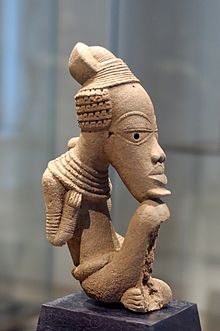
The Nok civilisation of Northern Nigeria flourished between 1,500 BC and AD 200. It produced life-sized terracotta figures that are some of the earliest known sculptures in Sub-Saharan Africa. and smelted iron by about 550 BC and possibly a few centuries earlier. Evidence of iron smelting has also been excavated at sites in the Nsukka region of southeast Nigeria: dating to 2000 BC at the site of Lejja (Uzomaka 2009) and to 750 BC and at the site of Opi (Holl 2009). Further north, the cities Kano and Katsina have a recorded history dating to around 999 AD. Hausa kingdoms and the Kanem–Bornu Empire prospered as trade posts between North and West Africa.
The Kingdom of Nri of the Igbo people consolidated in the 10th century and continued until it lost its sovereignty to the British in 1911. Nri was ruled by the Eze Nri, and the city of Nri is considered to be the foundation of Igbo culture. Nri and Aguleri, where the Igbo creation myth originates, are in the territory of the Umeuri clan. Members of the clan trace their lineages back to the patriarchal king-figure Eri. In West Africa, the oldest bronzes made using the lost-wax process were from Igbo-Ukwu, a city under Nri influence.
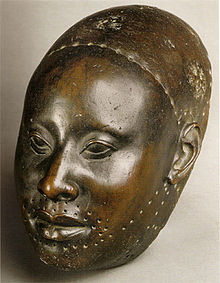
The Yoruba kingdoms of Ife and Oyo in southwestern Nigeria became prominent in the 12th and 14th centuries, respectively. The oldest signs of human settlement at Ife's current site date back to the 9th century, and its material culture includes terracotta and bronze figures.
Middle Ages (1500–1800)
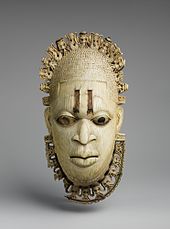
Oyo, at its territorial zenith in the late 17th to early 18th centuries, extended its influence from western Nigeria to modern-day Togo. The Edo's Benin Empire is located in southwestern Nigeria. Benin's power lasted between the 15th and 19th centuries. Their dominance reached as far as the city of Eko (an Edo name later changed to Lagos by the Portuguese) and further.
At the beginning of the 19th century, Usman dan Fodio directed a successful jihad and created and led the centralised Fulani Empire (also known as the Sokoto Caliphate). The territory controlled by the resultant state included much of modern-day northern and central Nigeria; it lasted until the 1903 break-up of the Empire into various European colonies.

For centuries, various peoples in modern-day Nigeria traded overland with traders from North Africa. Cities in the area became regional centres in a broad network of trade routes that spanned western, central and northern Africa. In the 16th century, Portuguese explorers were the first Europeans to begin significant, direct trade with peoples of modern-day Nigeria, at the port they named Lagos and in Calabar. Europeans traded goods with peoples at the coast; coastal trade with Europeans also marked the beginnings of the Atlantic slave trade. The port of Calabar on the historical Bight of Biafra (now commonly referred to as the Bight of Bonny) became one of the largest slave trading posts in West Africa in the era of the transatlantic slave trade. Other major slaving ports in Nigeria were located in Badagry, Lagos on the Bight of Benin and on Bonny Island on the Bight of Biafra. The majority of those enslaved and taken to these ports were captured in raids and wars. Usually the captives were taken back to the conquerors' territory as forced labour; after time, they were sometimes acculturated and absorbed into the conquerors' society. A number of slave routes were established throughout Nigeria linking the hinterland areas with the major coastal ports. Some of the more prolific slave traders were linked with the Oyo Empire in the southwest, the Aro Confederacy in the southeast and the Sokoto Caliphate in the north.
Slavery also existed in the territories comprising modern-day Nigeria; its scope was broadest towards the end of the 19th century. By the 1890s the largest slave population of the world, about 2 million people, was concentrated in the territories of the Sokoto Caliphate. The use of slave labor was extensive, especially in agriculture."
British Nigeria (1800–1960)
Main articles: Colonial Nigeria, Lagos Colony, Niger Coast Protectorate, Northern Nigeria Protectorate, and Southern Nigeria Protectorate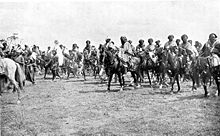
A changing legal imperative (transatlantic slave trade outlawed by Britain in 1807) and economic imperative (a desire for political and social stability) led most European powers to support widespread cultivation of agricultural products, such as the palm, for use in European industry. The Atlantic slave trade was engaged in by European companies until it was outlawed in 1807. After that illegal smugglers purchased slaves along the coast by native slavers. Britain's West Africa Squadron sought to intercept the smugglers at sea. The rescued slaves were taken to Freetown, a colony in West Africa originally established for the resettlement of freed slaves from Britain. Britain intervened in the Lagos Kingship power struggle by bombarding Lagos in 1851, deposing the slave trade friendly Oba Kosoko, helping to install the amenable Oba Akitoye, and signing the Treaty between Great Britain and Lagos on 1 January 1852. Britain annexed Lagos as a Crown Colony in August 1861 with the Lagos Treaty of Cession. British missionaries expanded their operations and travelled further inland. In 1864, Samuel Ajayi Crowther became the first African bishop of the Anglican Church.

In 1885, British claims to a West African sphere of influence received recognition from other European nations at the Berlin Conference. The following year, it chartered the Royal Niger Company under the leadership of Sir George Taubman Goldie. In 1900 the company's territory came under the control of the British government, which moved to consolidate its hold over the area of modern Nigeria. On 1 January 1901, Nigeria became a British protectorate, and part of the British Empire, the foremost world power at the time. In the late 19th and early 20th centuries the independent kingdoms of what would become Nigeria fought a number of conflicts against the British Empire's efforts to expand its territory. By war, the British conquered Benin in 1897, and, in the Anglo-Aro War (1901–1902), defeated other opponents. The restraint or conquest of these states opened up the Niger area to British rule. In 1914, the British formally united the Niger area as the Colony and Protectorate of Nigeria. Administratively, Nigeria remained divided into the Northern and Southern Protectorates and Lagos Colony. Inhabitants of the southern region sustained more interaction, economic and cultural, with the British and other Europeans owing to the coastal economy.

Christian missions established Western educational institutions in the Protectorates. Under Britain's policy of indirect rule and validation of Islamic tradition, the Crown did not encourage the operation of Christian missions in the northern, Islamic part of the country. Some children of the southern elite went to Great Britain to pursue higher education. By independence in 1960, regional differences in modern educational access were marked. The legacy, though less pronounced, continues to the present day. Imbalances between North and South were expressed in Nigeria's political life as well. For instance, northern Nigeria did not outlaw slavery until 1936 whilst in other parts of Nigeria slavery was abolished soon after colonialism.
Following World War II, in response to the growth of Nigerian nationalism and demands for independence, successive constitutions legislated by the British government moved Nigeria toward self-government on a representative and increasingly federal basis. By the middle of the 20th century, a great wave for independence was sweeping across Africa. Nigeria achieved independence in 1960.
Independent Federation and First Republic (1960–1966)
The Federation of Nigeria gained independence from the United Kingdom on 1 October 1960, while retaining the British monarch, Elizabeth II, as nominal head of state and Queen of Nigeria. Nigeria's government was a coalition of conservative parties: the Nigerian People's Congress (NPC), a party dominated by Northerners and those of the Islamic faith, and the Igbo and Christian-dominated National Council of Nigeria and the Cameroons (NCNC) led by Nnamdi Azikiwe. Azikiwe replaced the colonial governor-general in November 1960. The opposition comprised the comparatively liberal Action Group (AG), which was largely dominated by the Yoruba and led by Obafemi Awolowo. The cultural and political differences between Nigeria's dominant ethnic groups – the Hausa and Fulani ('Northerners'), Igbo ('Easterners') and Yoruba ('Westerners') – were sharp.
An imbalance was created in the polity by the result of the 1961 plebiscite. Southern Cameroons opted to join the Republic of Cameroon while Northern Cameroons chose to remain in Nigeria. The northern part of the country was now far larger than the southern part. In 1963, the nation established a Federal Republic, with Azikiwe as its first president. When elections were held in 1965, the Nigerian National Democratic Party came to power in Nigeria's Western Region.
Civil war (1967–1970)
Main article: Nigerian Civil War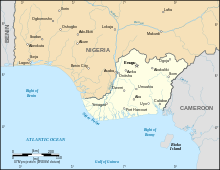
The disequilibrium and perceived corruption of the electoral and political process led, in 1966, to back-to-back military coups. The first coup was in January 1966 and was led mostly by Igbo soldiers under Majors Emmanuel Ifeajuna and Chukwuma Kaduna Nzeogwu. The coup plotters succeeded in assassinating Prime Minister Abubakar Tafawa Balewa, Premier Ahmadu Bello of the Northern Region and Premier Ladoke Akintola of the Western Region. But, the coup plotters struggled to form a central government. President Nwafor Orizu handed over government control to the Army, then under the command of another Igbo officer, General JTU Aguiyi-Ironsi. Later, the counter-coup of 1966, supported primarily by Northern military officers, facilitated the rise of Lt. Colonel Yakubu Gowon to head of state. Tension rose between North and South; Igbos in Northern cities suffered persecution and many fled to the Eastern Region.
In May 1967, the Southern Region declared independence as a state called the Republic of Biafra, under the leadership of Lt. Colonel Emeka Ojukwu. The Nigerian Civil War began as the official Nigerian government side attacked Biafra on 6 July 1967 at Garkem. The 30-month war, with a long siege of Biafra and its isolation from trade and supplies, ended in January 1970. Estimates of the number of dead in the former Eastern Region are between 1 and 3 million people, from warfare, disease, and starvation, during the 30-month civil war.
France, Egypt, the Soviet Union, Britain, Israel, and others were deeply involved in the civil war behind the scenes. Britain and the Soviet Union were the main military backers of the Nigerian government while France and others aided the Biafrans. Nigeria used Egyptian pilots for their air force.
Military juntas (1970–1999)
Main article: Nigerian military juntas of 1966–1979 and 1983–1998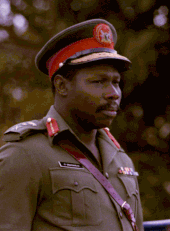
During the oil boom of the 1970s, Nigeria joined OPEC and the huge oil revenues it was generating enriched the economy. Despite these revenues, the military government did little to improve the standard of living of the population, help small and medium businesses, or invest in infrastructure. As oil revenues fueled the rise of federal subsidies to states, the federal government became the centre of political struggle and the threshold of power in the country. As oil production and revenue rose, the Nigerian government became increasingly dependent on oil revenues and on international commodity markets for budgetary and economic concerns. It did not develop alternate revenue sources in the economy for economic stability. That spelled doom to federalism in Nigeria.
Beginning in 1979, Nigerians participated in a return to democracy when Olusegun Obasanjo transferred power to the civilian regime of Shehu Shagari. The Shagari government became viewed as corrupt by virtually all sectors of Nigerian society. In 1983 the inspectors of the state-owned Nigerian National Petroleum Corporation (NNPC) began to notice "the slow poisoning of the waters of this country". The military coup of Muhammadu Buhari shortly after the regime's re-election in 1984 was generally viewed as a positive development. Buhari promised major reforms, but his government fared little better than its predecessor. His regime was overthrown by another military coup in 1985.
The new head of state, Ibrahim Babangida, declared himself president and commander in chief of the armed forces and of the ruling Supreme Military Council. He set 1990 as the official deadline for a return to democratic governance. Babangida's tenure was marked by a flurry of political activity: he instituted the International Monetary Fund's Structural Adjustment Program (SAP) to aid in the repayment of the country's crushing international debt. At the time most federal revenue was dedicated to servicing that debt. He enrolled Nigeria in the Organization of the Islamic Conference, which aggravated religious tensions in the country.
Babangida survived an abortive coup, then postponed a promised return to democracy to 1992. Free and fair elections were finally held on 12 June 1993, the first since the military coup of 1983, with a presidential victory for Moshood Kashimawo Olawale Abiola of the Social Democratic Party, who gained some 58% of the votes, defeating Bashir Tofa of the National Republican Convention. However, Babangida annulled the elections, leading to massive civilian protests that effectively shut down the country for weeks. Babangida finally kept his promise to relinquish office to a civilian government, but not before appointing Ernest Shonekan head of an interim government. Babangida's regime has been considered the most corrupt, and responsible for creating a culture of corruption in Nigeria.
In late 1993 Shonekan's caretaker regime was overwhelmed by the military coup of General Sani Abacha, who used military force on a wide scale to suppress the continuing civilian unrest. He shifted money to offshore accounts in western European banks and defeated coup plots by bribing army generals. In 1995 the government hanged environmentalist Ken Saro-Wiwa on trumped-up charges in the deaths of four Ogoni elders. Lawsuits under the American Alien Tort Statute against Royal Dutch Shell and Brian Anderson, the head of Shell's Nigerian operation, settled out of court with Shell continuing to deny liability.
Several hundred million dollars in accounts traced to Abacha were discovered in 1999. The regime came to an end in 1998, when the dictator died in the villa. His successor, General Abdulsalami Abubakar, adopted a new constitution on 5 May 1999, which provided for multiparty elections. On 29 May 1999 Abubakar transferred power to the winner of the elections, Obasanjo, who had since retired from the military.
Democratisation (1999–)

Nigeria regained democracy in 1999 when it elected Olusegun Obasanjo, the former military head of state, as the new President of Nigeria. This ended almost 33 years of military rule (from 1966 until 1999), excluding the short-lived second republic (between 1979 and 1983) by military dictators who seized power in coups d'état and counter-coups during the Nigerian military juntas of 1966–1979 and 1983–1998. Although the elections that brought Obasanjo to power in 1999 and again in 2003 were condemned as unfree and unfair, Nigeria has shown marked improvements in attempts to tackle government corruption and to hasten development.
Ethnic violence for control over the oil-producing Niger Delta region and inadequate infrastructures are some of the issues in the country. Umaru Yar'Adua of the People's Democratic Party (PDP) came into power in the general election of 2007. The international community has been observing Nigerian elections to encourage a free and fair process, and condemned this one as being severely flawed.
Yar'Adua died on 5 May 2010. Dr. Goodluck Jonathan was sworn in as Yar'Adua's replacement on 6 May 2010, becoming Nigeria's 14th Head of State, while his vice-president, Namadi Sambo, an architect and former Kaduna State governor, was chosen on 18 May 2010, by the National Assembly. His confirmation followed President Jonathan's nomination of Sambo to that position.
Goodluck Jonathan served as Nigeria's president until 16 April 2011, when a new presidential election in Nigeria was conducted. Jonathan of the PDP was declared the winner on 19 April 2011, having won the election with a total of 22,495,187 of the 39,469,484 votes cast, to stand ahead of Muhammadu Buhari from the main opposition party, the Congress for Progressive Change (CPC), which won 12,214,853 of the total votes cast. The international media reported the elections as having run smoothly with relatively little violence or voter fraud, in contrast to previous elections.
In the March 2015 election, Muhammadu Buhari defeated Goodluck Jonathan by roughly 2 million votes. Observers generally praised the election as being fair. Jonathan was generally praised for conceding defeat and limiting the risk of unrest.
Government and politics
Main article: Politics of Nigeria

Nigeria is a federal republic modelled after the United States, with executive power exercised by the President. It is influenced by the Westminster System model in the composition and management of the upper and lower houses of the bicameral legislature. The president presides as both head of state and head of the federal government; the leader is elected by popular vote to a maximum of two 4-year terms. In 28 March 2015 presidential election, General Muhammadu Buhari emerged victorious to become the President of the Federal Republic of Nigeria, defeating then-incumbent Dr Goodluck Jonathan. Despite the economic slow down in the country Muhammadu Buhari was re-elected in February 2019 for a second term.
The president's power is checked by a Senate and a House of Representatives, which are combined in a bicameral body called the National Assembly. The Senate is a 109-seat body with three members from each state and one from the capital region of Abuja; members are elected by popular vote to four-year terms. The House contains 360 seats, with the number of seats per state determined by population.
Ethnocentrism, tribalism, religious persecution, and prebendalism have affected Nigerian politics both prior and subsequent to independence in 1960. Kin-selective altruism has made its way into Nigerian politics, resulting in tribalist efforts to concentrate Federal power to a particular region of their interests. Nationalism has also led to active secessionist movements such as MASSOB, Nationalist movements such as Oodua Peoples Congress, Movement for the Emancipation of the Niger Delta and a civil war. Nigeria's three largest ethnic groups (Hausa, Igbo and Yoruba) have maintained historical preeminence in Nigerian politics; competition amongst these three groups has fuelled corruption and graft.
Because of the above issues, Nigeria's political parties are pan-national and secular in character (though this does not preclude the continuing preeminence of the dominant ethnicities). The two major political parties are the People's Democratic Party of Nigeria and the All Progressives Congress. About twenty minor opposition parties are registered.
The then-president, Olusegun Obasanjo, acknowledged fraud and other electoral "lapses" but said the result reflected opinion polls. In a national television address in 2007, he added that if Nigerians did not like the victory of his handpicked successor, they would have an opportunity to vote again in four years.
In the Nigerian general election, 2015, the victorious All Progressives Congress has 225 House seats and 60 in the Senate while the defeated People's Democratic Party of Nigeria became the opposition with 125 seats in the House and 49 in the Senate.
Template:Nigerian symbols As in many other African societies, prebendalism and high rates of corruption continue to constitute major challenges to Nigeria. All major parties have practised vote-rigging and other means of coercion to remain competitive. In the period before 1983 election, a report of experts prepared by the National Institute of Policy and Strategic Studies showed that only the 1959 and 1979 elections were held without systematic rigging. In 2012, Nigeria was estimated to have lost over $400 billion to corruption since independence.
Law
Main article: Law of NigeriaThere are three distinct systems of law in Nigeria:
- Common law, derived from its British colonial past, and a development of its own after independence;
- Customary law, derived from indigenous traditional norms and practice, including the dispute resolution meetings of pre-colonial Yorubaland secret societies and the Ẹ̀kpẹ̀ and Ọ̀kọ́ńkọ̀ of Igboland and Ibibioland;
- Sharia law, used only in the predominantly Muslim northern states of the country. It is an Islamic legal system that had been used long before the colonial administration. In late 1999, Zamfara emphasised its use, with eleven other northern states following suit. These states are Kano, Katsina, Niger, Bauchi, Borno, Kaduna, Gombe, Sokoto, Jigawa, Yobe, and Kebbi.
The country has a judicial branch, the highest court of which is the Supreme Court of Nigeria.
Foreign relations
Main article: Foreign relations of Nigeria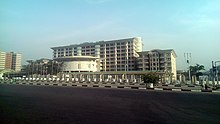
Upon gaining independence in 1960, Nigeria made African unity the centrepiece of its foreign policy and played a leading role in the fight against the apartheid government in South Africa. One exception to the African focus was Nigeria's close relationship developed with Israel throughout the 1960s. The latter nation sponsored and oversaw the construction of Nigeria's parliament buildings.
Nigeria's foreign policy was tested in the 1970s after the country emerged united from its own civil war. It supported movements against white minority governments in the Southern Africa sub-region. Nigeria backed the African National Congress (ANC) by taking a committed tough line with regard to the South African government and their military actions in southern Africa. Nigeria was also a founding member of the Organisation for African Unity (now the African Union), and has tremendous influence in West Africa and Africa on the whole. Nigeria has additionally founded regional cooperative efforts in West Africa, functioning as standard-bearer for the Economic Community of West African States (ECOWAS) and ECOMOG, economic and military organizations, respectively.
With this Africa-centred stance, Nigeria readily sent troops to the Congo at the behest of the United Nations shortly after independence (and has maintained membership since that time). Nigeria also supported several Pan-African and pro-self government causes in the 1970s, including garnering support for Angola's MPLA, SWAPO in Namibia, and aiding opposition to the minority governments of Portuguese Mozambique, and Rhodesia.
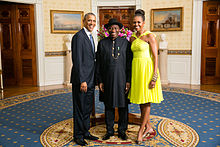
Nigeria retains membership in the Non-Aligned Movement. In late November 2006, it organised an Africa-South America Summit in Abuja to promote what some attendees termed "South-South" linkages on a variety of fronts. Nigeria is also a member of the International Criminal Court, and the Commonwealth of Nations. It was temporarily expelled from the latter in 1995 when ruled by the Abacha regime.
Nigeria has remained a key player in the international oil industry since the 1970s, and maintains membership in Organization of the Petroleum Exporting Countries (OPEC), which it joined in July 1971. Its status as a major petroleum producer figures prominently in its sometimes volatile international relations with both developed countries, notably the United States, and the developing countries of China, Jamaica, and Ghana and Kenya in Africa.
Millions of Nigerians have emigrated during times of economic hardship, primarily to Europe, North America and Australia. It is estimated that over a million Nigerians have emigrated to the United States and constitute the Nigerian American populace. Individuals in many such Diasporic communities have joined the "Egbe Omo Yoruba" society, a national association of Yoruba descendants in North America.
In July 2019, UN ambassadors of 37 countries, including Nigeria, have signed a joint letter to the UNHRC defending China's treatment of Uyghurs in the Xinjiang region.
Military
Main article: Nigerian Armed Forces

The Nigerian military are charged with protecting the Federal Republic of Nigeria, promoting Nigeria's global security interests, and supporting peacekeeping efforts, especially in West Africa. This is in support of the doctrine sometimes called Pax Nigeriana.
The Nigerian Military consist of an army, a navy, and an air force. The military in Nigeria have played a major role in the country's history since independence. Various juntas have seized control of the country and ruled it through most of its history. Its last period of military rule ended in 1999 following the sudden death of former dictator Sani Abacha in 1998. His successor, Abdulsalam Abubakar, handed over power to the democratically-elected government of Olusegun Obasanjo the next year.
As Africa's most populated country, Nigeria has repositioned its military as a peacekeeping force on the continent. Since 1995, the Nigerian military, through ECOMOG mandates, have been deployed as peacekeepers in Liberia (1997), Ivory Coast (1997–1999), and Sierra Leone (1997–1999). Under an African Union mandate, it has stationed forces in Sudan's Darfur region to try to establish peace.
In 2017, Nigeria signed the UN treaty on the Prohibition of Nuclear Weapons.
Geography and geology
Main articles: Geography of Nigeria and Geology of Nigeria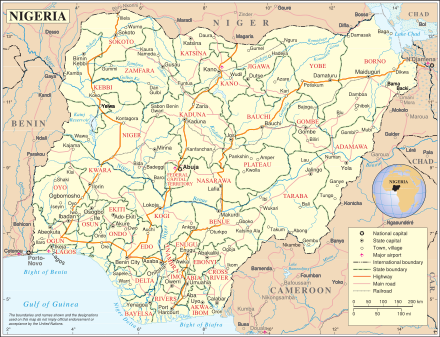
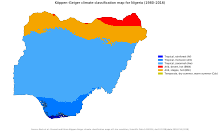
Nigeria is located in western Africa on the Gulf of Guinea and has a total area of 923,768 km (356,669 sq mi), making it the world's 32nd-largest country. It is comparable in size to Venezuela, and is about twice the size of the US state of California. Its borders span 4,047 kilometres (2,515 mi), and it shares borders with Benin (773 km or 480 mi), Niger (1,497 km or 930 mi), Chad (87 km or 54 mi), and Cameroon (1,690 km or 1,050 mi). It's coastline is least 853 km (530 mi). Nigeria lies between latitudes 4° and 14°N, and longitudes 2° and 15°E.

The highest point in Nigeria is Chappal Waddi at 2,419 m (7,936 ft). The main rivers are the Niger and the Benue, which converge and empty into the Niger Delta. This is one of the world's largest river deltas, and the location of a large area of Central African mangroves.
Nigeria has a varied landscape. The far south is defined by its tropical rainforest climate, where annual rainfall is 60 to 80 inches (1,500 to 2,000 mm) a year. In the southeast stands the Obudu Plateau. Coastal plains are found in both the southwest and the southeast. This forest zone's most southerly portion is defined as "salt water swamp", also known as a mangrove swamp because of the large amount of mangroves in the area. North of this is fresh water swamp, containing different vegetation from the salt water swamp, and north of that is rainforest.
Nigeria's most expansive topographical region is that of the valleys of the Niger and Benue river valleys (which merge into each other and form a Y-shape). To the southwest of the Niger is "rugged" highland. To the southeast of the Benue are hills and mountains, which form the Mambilla Plateau, the highest plateau in Nigeria. This plateau extends through the border with Cameroon, where the montane land is part of the Bamenda Highlands of Cameroon.
The area near the border with Cameroon close to the coast is rich rainforest and part of the Cross-Sanaga-Bioko coastal forests ecoregion, an important centre for biodiversity. It is habitat for the drill monkey, which is found in the wild only in this area and across the border in Cameroon. The areas surrounding Calabar, Cross River State, also in this forest, are believed to contain the world's largest diversity of butterflies. The area of southern Nigeria between the Niger and the Cross Rivers has lost most of its forest because of development and harvesting by increased population, with it being replaced by grassland (see Cross-Niger transition forests).
Everything in between the far south and the far north is savannah (insignificant tree cover, with grasses and flowers located between trees). Rainfall is more limited, to between 500 and 1,500 millimetres (20 and 60 in) per year. The savannah zone's three categories are Guinean forest-savanna mosaic, Sudan savannah, and Sahel savannah. Guinean forest-savanna mosaic is plains of tall grass interrupted by trees. Sudan savannah is similar but with shorter grasses and shorter trees. Sahel savannah consists of patches of grass and sand, found in the northeast. In the Sahel region, rain is less than 500 millimetres (20 in) per year and the Sahara Desert is encroaching. In the dry northeast corner of the country lies Lake Chad, which Nigeria shares with Niger, Chad and Cameroon.
Environmental issues
Main articles: Environmental issues in the Niger Delta and Deforestation in Nigeria

Nigeria's Delta region, home of the large oil industry, experiences serious oil spills and other environmental problems, which has caused conflict.
Waste management including sewage treatment, the linked processes of deforestation and soil degradation, and climate change or global warming are the major environmental problems in Nigeria. Waste management presents problems in a mega city like Lagos and other major Nigerian cities which are linked with economic development, population growth and the inability of municipal councils to manage the resulting rise in industrial and domestic waste. This huge waste management problem is also attributable to unsustainable environmental management lifestyles of Kubwa Community in the Federal Capital Territory, where there are habits of indiscriminate disposal of waste, dumping of waste along or into the canals, sewerage systems that are channels for water flows, and the like.
Haphazard industrial planning, increased urbanisation, poverty and lack of competence of the municipal government are seen as the major reasons for high levels of waste pollution in major cities of the country. Some of the 'solutions' have been disastrous to the environment, resulting in untreated waste being dumped in places where it can pollute waterways and groundwater.
In 2005 Nigeria had the highest rate of deforestation in the world, according to the Food and Agriculture Organization of the United Nations (FAO). That year, 12.2%, the equivalent of 11,089,000 hectares had been forested in the country. Between 1990 and 2000, Nigeria lost an average of 409,700 hectares of forest every year equal to an average annual deforestation rate of 2.4%. Between 1990 and 2005, in total Nigeria lost 35.7% of its forest cover, or around 6,145,000 hectares.
In 2010, thousands of people were inadvertently exposed to lead-containing soil / ore from informal gold mining within the northern state of Zamfara. While estimates vary, it is thought that upwards of 400 children died of acute lead poisoning, making this perhaps the largest lead poisoning fatality epidemic ever encountered. As of 2016, efforts to manage the exposure are ongoing.
Administrative divisions
Main article: Administrative divisions of Nigeria| Major cities | |
| City | Population |
|---|---|
| Lagos | 8,048,430 |
| Kano | 3,931,300 |
| Ibadan | 2,559,853 |
| Benin City | 1,147,188 |
| Port Harcourt | 1,005,904 |
Nigeria is divided into thirty-six states and one Federal Capital Territory, which are further sub-divided into 774 Local Government Areas (LGAs). In some contexts, the states are aggregated into six geopolitical zones: North West, North East, North Central, South East, South South, and South West.
As of the 2006 census, Nigeria has five cities with a population of over 1 million people (from largest to smallest): Lagos, Kano, Ibadan, Benin City and Port Harcourt. Lagos is the largest city in Africa, with a population of over 12 million in its urban area.
A clickable map of Nigeria showing its 36 states and the federal capital territory.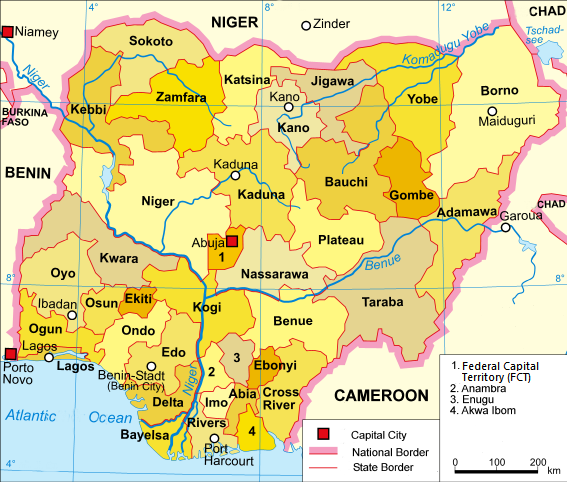
| ||||||||||||
Economy
Main article: Economy of Nigeria


Nigeria is classified as a mixed economy emerging market. It has reached lower middle income status according to the World Bank, with its abundant supply of natural resources, well-developed financial, legal, communications, transport sectors and stock exchange (the Nigerian Stock Exchange), which is the second largest in Africa.
Nigeria was ranked 21st in the world in terms of GDP (PPP) in 2015. Nigeria is the United States' largest trading partner in sub-Saharan Africa and supplies a fifth of its oil (11% of oil imports). It has the seventh-largest trade surplus with the US of any country worldwide. Nigeria is the 50th-largest export market for US goods and the 14th-largest exporter of goods to the US. The United States is the country's largest foreign investor. The International Monetary Fund (IMF) projected economic growth of 9% in 2008 and 8.3% in 2009. The IMF further projects an 8% growth in the Nigerian economy in 2011.
In February 2011, Citigroup projected that Nigeria would have the highest average GDP growth in the world in 2010–2050. Nigeria is one of two countries from Africa among 11 Global Growth Generators countries.
Previously, economic development had been hindered by years of military rule, corruption, and mismanagement. The restoration of democracy and subsequent economic reforms have successfully put Nigeria back on track towards achieving its full economic potential. As of 2014 it is the largest economy in Africa, having overtaken South Africa.
During the oil boom of the 1970s, Nigeria accumulated a significant foreign debt to finance major infrastructural investments. With the fall of oil prices during the 1980s oil glut Nigeria struggled to keep up with its loan payments and eventually defaulted on its principal debt repayments, limiting repayment to the interest portion of the loans. Arrears and penalty interest accumulated on the unpaid principal, which increased the size of the debt. After negotiations by the Nigerian authorities, in October 2005 Nigeria and its Paris Club creditors reached an agreement under which Nigeria repurchased its debt at a discount of approximately 60%. Nigeria used part of its oil profits to pay the residual 40%, freeing up at least $1.15 billion annually for poverty reduction programmes. Nigeria made history in April 2006 by becoming the first African country to completely pay off its debt (estimated $30 billion) owed to the Paris Club.
Nigeria is trying to reach the first of the Sustainable Development Goals, which is to end poverty in all its forms by 2030.
Agriculture
Further information: Agriculture in Nigeria
As of 2010, about 30% of Nigerians are employed in agriculture. Agriculture used to be the principal foreign exchange earner of Nigeria.
Major crops include beans, sesame, cashew nuts, peanuts cassava, cocoa beans, groundnuts, gum arabic, kolanut, maize (corn), melon, millet, palm kernels, palm oil, plantains, rice, rubber, sorghum, soybeans and yams. Cocoa is the leading non-oil foreign exchange earner. Rubber is the second-largest non-oil foreign exchange earner.
Prior to the Nigerian civil war, Nigeria was self-sufficient in food. Agriculture has failed to keep pace with Nigeria's rapid population growth, and Nigeria now relies upon food imports to sustain itself. The Nigerian government promoted the use of inorganic fertilizers in the 1970s. In August 2019, Nigeria closed its border with Benin to stop rice smuggling into the country as part of efforts to boost the local production.
Oil and natural gas
Further information: Petroleum industry in Nigeria and List of countries by oil exports
Nigeria is the 12th largest producer of petroleum in the world and the 8th largest exporter, and has the 10th largest proven reserves. (The country joined OPEC in 1971.) Petroleum plays a large role in the Nigerian economy, accounting for 40% of GDP and 80% of Government earnings. However, agitation for better resource control in the Niger Delta, its main oil-producing region, has led to disruptions in oil production and prevents the country from exporting at 100% capacity.

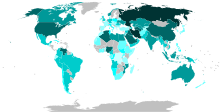
The Niger Delta Nembe Creek Oil field was discovered in 1973 and produces from middle Miocene deltaic sandstone-shale in an anticline structural trap at a depth of 2 to 4 kilometres (1.2 to 2.5 miles). In June 2013, Shell announced a strategic review of its operations in Nigeria, hinting that assets could be divested. While many international oil companies have operated there for decades, by 2014 most were making moves to divest their interests, citing a range of issues including oil theft. In August 2014, Shell Oil Company said it was finalising its interests in four Nigerian oil fields.
Nigeria has a total of 159 oil fields and 1,481 wells in operation according to the Department of Petroleum Resources. The most productive region of the nation is the coastal Niger Delta Basin in the Niger Delta or "South-south" region which encompasses 78 of the 159 oil fields. Most of Nigeria's oil fields are small and scattered, and as of 1990, these small fields accounted for 62.1% of all Nigerian production. This contrasts with the sixteen largest fields which produced 37.9% of Nigeria's petroleum at that time.
 Oil facility at Bonny Island, Rivers State
Oil facility at Bonny Island, Rivers State
Overseas remittances
Next to petrodollars, the second biggest source of foreign exchange earnings for Nigeria are remittances sent home by Nigerians living abroad.
According to the International Organization for Migration, Nigeria witnessed a dramatic increase in remittances sent home from overseas Nigerians, going from US$2.3 billion in 2004 to 17.9 billion in 2007. The United States accounts for the largest portion of official remittances, followed by the United Kingdom, Italy, Canada, Spain and France. On the African continent, Egypt, Equatorial Guinea, Chad, Libya and South Africa are important source countries of remittance flows to Nigeria, while China is the biggest remittance-sending country in Asia.
Services

Nigeria has one of the fastest growing telecommunications markets in the world, major emerging market operators (like MTN, 9mobile, Airtel and Globacom) basing their largest and most profitable centres in the country. The government has recently begun expanding this infrastructure to space based communications. Nigeria has a space satellite that is monitored at the Nigerian National Space Research and Development Agency Headquarters in Abuja.
Nigeria has a highly developed financial services sector, with a mix of local and international banks, asset management companies, brokerage houses, insurance companies and brokers, private equity funds and investment banks.
Mining
Further information: Mining industry of Nigeria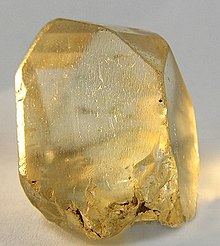
Nigeria also has a wide array of underexploited mineral resources which include natural gas, coal, bauxite, tantalite, gold, tin, iron ore, limestone, niobium, lead and zinc. Despite huge deposits of these natural resources, the mining industry in Nigeria is still in its infancy.
Manufacturing and technology

Nigeria has a manufacturing industry that includes leather and textiles (centred on Kano, Abeokuta, Onitsha, and Lagos), Nigeria currently has an indigenous auto manufacturing company; Innoson Vehicle Manufacturing located in Nnewi. It produces Buses and SUVs.car manufacturing (for the French car manufacturer Peugeot as well as for the English truck manufacturer Bedford, now a subsidiary of General Motors), T-shirts, plastics and processed food.
Nigeria in recent years has been embracing industrialisation. It currently has an indigenous vehicle manufacturing company, Innoson Motors, which manufactures Rapid Transit Buses, trucks and SUVs with an upcoming introduction of cars. Nigeria also has few Electronic manufacturers like Zinox, the first Branded Nigerian Computer and Electronic gadgets (like tablet PCs) manufacturers. In 2013, Nigeria introduced a policy regarding import duty on vehicles to encourage local manufacturing companies in the country. In this regard, some foreign vehicle manufacturing companies like Nissan have made known their plans to have manufacturing plants in Nigeria. Ogun is considered to be the current Nigeria's industrial hub, as most factories are located in Ogun and more companies are moving there, followed by Lagos. The city of Aba in south-eastern part of the country are well known for their handicrafts, famously known as "Aba made".
Government satellites
The Nigerian government has commissioned the overseas production and launch of four satellites. The Nigeriasat-1 was the first satellite to be built under the Nigerian government sponsorship. The satellite was launched from Russia on 27 September 2003. Nigeriasat-1 was part of the worldwide Disaster Monitoring Constellation System. The primary objectives of the Nigeriasat-1 were: to give early warning signals of environmental disaster; to help detect and control desertification in the northern part of Nigeria; to assist in demographic planning; to establish the relationship between malaria vectors and the environment that breeds malaria and to give early warning signals on future outbreaks of meningitis using remote sensing technology; to provide the technology needed to bring education to all parts of the country through distant learning; and to aid in conflict resolution and border disputes by mapping out state and International borders.
NigeriaSat-2, Nigeria's second satellite, was built as a high-resolution earth satellite by Surrey Space Technology Limited, a United Kingdom-based satellite technology company. It has 2.5-metre resolution panchromatic (very high resolution), 5-metre multispectral (high resolution, NIR red, green and red bands), and 32-metre multispectral (medium resolution, NIR red, green and red bands) antennas, with a ground receiving station in Abuja. The NigeriaSat-2 spacecraft alone was built at a cost of over £35 million. This satellite was launched into orbit from a military base in China.
NigComSat-1, a Nigerian satellite built in 2004, was Nigeria's third satellite and Africa's first communication satellite. It was launched on 13 May 2007, aboard a Chinese Long March 3B carrier rocket, from the Xichang Satellite Launch Centre in China. The spacecraft was operated by NigComSat and the Nigerian Space Agency, NASRDA. On 11 November 2008, NigComSat-1 failed in orbit after running out of power because of an anomaly in its solar array. It was based on the Chinese DFH-4 satellite bus, and carries a variety of transponders: 4 C-band; 14 Ku-band; 8 Ka-band; and 2 L-band. It was designed to provide coverage to many parts of Africa, and the Ka-band transponders would also cover Italy.
On 10 November 2008 (0900 GMT), the satellite was reportedly switched off for analysis and to avoid a possible collision with other satellites. According to Nigerian Communications Satellite Limited, it was put into "emergency mode operation in order to effect mitigation and repairs". The satellite eventually failed after losing power on 11 November 2008.
On 24 March 2009, the Nigerian Federal Ministry of Science and Technology, NigComSat Ltd. and CGWIC signed another contract for the in-orbit delivery of the NigComSat-1R satellite. NigComSat-1R was also a DFH-4 satellite, and the replacement for the failed NigComSat-1 was successfully launched into orbit by China in Xichang on 19 December 2011. The satellite, according to then-Nigerian President Goodluck Jonathan, was paid for by the insurance policy on NigComSat-1, which de-orbited in 2009. It was stated the satellite would have a positive impact on national development in various sectors such as communications, internet services, health, agriculture, environmental protection and national security.
Society
Demographics
Main article: Demographics of Nigeria
| Population in Nigeria | |||
|---|---|---|---|
| Year | Million | ||
| 1971 | 55 | ||
| 1980 | 71 | ||
| 1990 | 95 | ||
| 2000 | 125 | ||
| 2004 | 138 | ||
| 2008 | 151 | ||
| 2012 | 167 | ||
| 2016 | 186 | ||
| 2017 | 191 | ||
Nigeria's population increased by 57 million from 1990 to 2008, a 60% growth rate in less than two decades. As of 2017, the population stood at 191 million. Around 42.5% of the population were 14 years or younger, 19.6% were aged 15–24, 30.7% were aged 25–54, 4.0% aged 55–64, and 3.1% aged 65 years or older. The median age in 2017 was 18.4 years. Nigeria is the most populous country in Africa and accounts for about 17% of the continent's total population as of 2017; however, exactly how populous is a subject of speculation.
The United Nations estimates that the population in 2021 was at 213,401,323, distributed as 51.7% rural and 48.3% urban, and with a population density of 167.5 people per square kilometre. National census results in the past few decades have been disputed. The results of the most recent census were released in December 2006 and gave a population of 140,003,542. The only breakdown available was by gender: males numbered 71,709,859, females numbered 68,293,008. In June 2012, President Goodluck Jonathan said that Nigerians should limit their number of children.
According to the United Nations, Nigeria has been undergoing explosive population growth and has one of the highest growth and fertility rates in the world. By their projections, Nigeria is one of eight countries expected to account collectively for half of the world's total population increase in 2005–2050. By 2100 the UN estimates that the Nigerian population will be between 505 million and 1.03 billion people (middle estimate: 730 million). In 1950, Nigeria had only 33 million people.
One in six Africans is Nigerian as of 2019. Presently, Nigeria is the seventh most populous country in the world. The birth rate is 35.2-births/1000 population and the death rate is 9.6 deaths/1000 population as of 2017, while the total fertility rate is 5.07 children born/woman.
Nigeria's largest city is Lagos. Lagos has grown from about 300,000 in 1950 to an estimated 13.4 million in 2017.
| Largest Cities in Nigeria, 2017 | |||
|---|---|---|---|
| City | Million | ||
| Lagos | 13.463 | ||
| Kano | 3.82 | ||
| Ibadan | 3.383 | ||
| Abuja | 2.919 | ||
| Port Harcourt | 2.343 | ||
| Benin City | 1.628 | ||
Ethnic groups
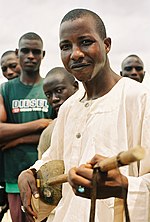
|

|

|
| A Hausa lute player | Igbo Chief | Yoruba drummers |
Nigeria has more than 250 ethnic groups, with varying languages and customs, creating a country of rich ethnic diversity. The three largest ethnic groups are the Hausa, Yoruba and Igbo, together accounting for more than 70% of the population, while the Edo, Ijaw, Fulɓe, Kanuri, Urhobo-Isoko, Ibibio, Ebira, Nupe, Gbagyi, Jukun, Igala, Idoma and Tiv comprise between 25 and 30%; other minorities make up the remaining 5%.
The middle belt of Nigeria is known for its diversity of ethnic groups, including the Pyem, Goemai, and Kofyar. The official population count of each of Nigeria's ethnicities has always remained controversial and disputed as members of different ethnic groups believe the census is rigged to give a particular group (usually believed to be northern groups) numerical superiority.
There are small minorities of British, American, East Indian, Chinese (est. 50,000), white Zimbabwean, Japanese, Greek, Syrian and Lebanese immigrants in Nigeria. Immigrants also include those from other West African or East African nations. These minorities mostly reside in major cities such as Lagos and Abuja, or in the Niger Delta as employees for the major oil companies. A number of Cubans settled in Nigeria as political refugees following the Cuban Revolution.
In the middle of the 19th century, a number of ex-slaves of Afro-Cuban and Afro-Brazilian descent and emigrants from Sierra Leone established communities in Lagos and other regions of Nigeria. Many ex-slaves came to Nigeria following the emancipation of slaves in the Americas. Many of the immigrants, sometimes called Saro (immigrants from Sierra Leone) and Amaro (ex-slaves from Brazil) later became prominent merchants and missionaries in these cities.
Languages
Main article: Languages of Nigeria| This section needs additional citations for verification. Please help improve this article by adding citations to reliable sources in this section. Unsourced material may be challenged and removed. Find sources: "Nigeria" – news · newspapers · books · scholar · JSTOR (July 2018) (Learn how and when to remove this message) |

There are 521 languages that have been spoken in Nigeria; nine of them are now extinct.
In some areas of Nigeria, ethnic groups speak more than one language. The official language of Nigeria, English, was chosen to facilitate the cultural and linguistic unity of the country, owing to the influence of British colonisation that ended in 1960.
Many French speakers from surrounding countries have influenced the English spoken in the border regions of Nigeria and some Nigerian citizens have become fluent enough in French to work in the surrounding countries. The French spoken in Nigeria may be mixed with some native languages but is mostly spoken like the French spoken in Benin. French may also be mixed with English as it is in Cameroon.
The major languages spoken in Nigeria represent three major families of languages of Africa: the majority are Niger-Congo languages, such as Igbo, Yoruba, Ijaw, Fulfulde, and Edo. Kanuri, spoken in the northeast, primarily in Borno and Yobe State, is part of the Nilo-Saharan family, and Hausa is an Afroasiatic language.
Even though most ethnic groups prefer to communicate in their own languages, English as the official language is widely used for education, business transactions and for official purposes. English as a first language is used only by a small minority of the country's urban elite, and it is not spoken at all in some rural areas. Hausa is the most widely spoken of the three main languages spoken in Nigeria itself.
With the majority of Nigeria's populace in the rural areas, the major languages of communication in the country remain indigenous languages. Some of the largest of these, notably Yoruba and Igbo, have derived standardised languages from a number of different dialects and are widely spoken by those ethnic groups. Nigerian Pidgin English, often known simply as "Pidgin" or "Broken" (Broken English), is also a popular lingua franca, though with varying regional influences on dialect and slang. The pidgin English or Nigerian English is widely spoken within the Niger Delta Regions, predominantly in Warri, Sapele, Port Harcourt, Agenebode, Ewu, and Benin City.
Religion
Main article: Religion in NigeriaReligion in Nigeria (2013)
Islam (51.6%) Christianity (47%) Traditional African religions (1.4%)Nigeria is a religiously diverse society, with Christianity and Islam being the most widely professed religions. Nigerians are nearly equally divided into Christians and Muslims, with a tiny minority of adherents of Traditional African religions and other religions. As common in other parts of Africa where Christianity and Islam are dominant, religious syncretism with the Traditional African religions is common throughout Nigeria.
Islam dominates North Western (Hausa, Fulani and others) and a good portion of Northern Eastern (Kanuri, Fulani and other groups) Nigeria. It also has a number of adherents in the South Western, Yoruba part of the country. Nigeria has the largest Muslim population in sub-Saharan Africa. Protestant and locally cultivated Christianity are also widely practiced in Western areas, while Roman Catholicism is a more prominent Christian feature of South Eastern Nigeria. Both Roman Catholicism and Protestantism are observed in the Ibibio, Annang, Efik and Ijo lands of the south.
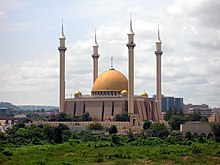
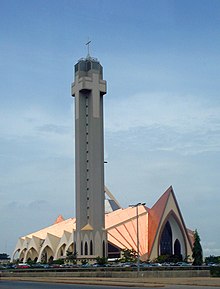
The 1963 census indicated that 47% of Nigerians were Muslim, 34% Christian, and 18% members of local indigenous religions. The vast majority of Muslims in Nigeria are Sunni belonging to Maliki school of jurisprudence; however, a sizeable minority also belongs to Shafi Madhhab. A large number of Sunni Muslims are members of Sufi brotherhoods. Most Sufi's follow the Qadiriyya, Tijaniyyah and/or the Mouride movements. A significant Shia minority exists (see Shia in Nigeria). Some northern states have incorporated Sharia law into their previously secular legal systems, which has brought about some controversy. Kano State has sought to incorporate Sharia law into its constitution. The majority of Quranists follow the Kalo Kato or Quraniyyun movement. There are also Ahmadiyya and Mahdiyya minorities, as well as Bahá'ís.
According to a 2001 report from The World Factbook by CIA, about 47% of Nigeria's population is Muslim, 43% are Christians and 10% adhere to local religions. An 18 December 2012 report on religion and public life by the Pew Research Center stated that in 2010, 49.3 percent of Nigeria's population was Christian, 48.8 percent was Muslim, and 1.9 percent were followers of indigenous and other religions, or unaffiliated. However in a 2019 report released by Pew Research Center in 2015 the Muslim population was estimated to be 50% and in 2060 according to the report Muslims will account for 60% of the Country.
The 2010 census of Association of Religion Data Archives has also reported that 46.5% of the total population was Christian, slightly larger than the Muslim population of 45.5%, while 7.7% were members of other religions. However, these estimates should be taken with caution because sample data is mostly collected from major urban areas in the south, which are predominantly Christian.
Among Christians, the Pew Research survey found that 74% were Protestant, 25% were Catholic, and 1% belonged to other Christian denominations, including a small Orthodox Christian community. In terms of Nigeria's major ethnic groups, the Hausa ethnic group (predominant in the north) was found to be 95% Muslim and 5% Christian, the Yoruba tribe (predominant in the west) was 55% Muslim, 35% Christian and 10% adherents of other religions, while the Igbos (predominant in the east) and the Ijaw (south) were 98% Christian, with 2% practicing traditional religions. The middle belt of Nigeria contains the largest number of minority ethnic groups in Nigeria, who were found to be mostly Christians and members of traditional religions, with a small proportion of Muslims.
Leading Protestant churches in the country include the Church of Nigeria of the Anglican Communion, the Assemblies of God Church, the Nigerian Baptist Convention and The Synagogue, Church Of All Nations. Since the 1990s, there has been significant growth in many other churches, independently started in Africa by Africans, particularly the evangelical Protestant ones. These include the Redeemed Christian Church of God, Winners' Chapel, Christ Apostolic Church (the first Aladura Movement in Nigeria), Living Faith Church Worldwide, Deeper Christian Life Ministry, Evangelical Church of West Africa, Mountain of Fire and Miracles, Christ Embassy, Lord's Chosen Charismatic Revival Movement, Celestial Church of Christ, and Dominion City. In addition, The Church of Jesus Christ of Latter-day Saints, the Aladura Church, the Seventh-day Adventist and various indigenous churches have also experienced growth.
The Yoruba area contains a large Anglican population, while Igboland is predominantly Roman Catholic and the Edo area is composed predominantly of members of the Pentecostal Assemblies of God, which was introduced into Nigeria by Augustus Ehurie Wogu and his associates at Old Umuahia.
Further, Nigeria has become an African hub for the Grail Movement and the Hare Krishnas, and the largest temple of the Eckankar religion is in Port Harcourt, Rivers State, with a total capacity of 10,000.
The Church of Jesus Christ of Latter-Day Saints (LDS) announced creation of new Owerri mission in Nigeria in 2016.
Health
Further information: Health in Nigeria


Health care delivery in Nigeria is a concurrent responsibility of the three tiers of government in the country, and the private sector. Nigeria has been reorganising its health system since the Bamako Initiative of 1987, which formally promoted community-based methods of increasing accessibility of drugs and health care services to the population, in part by implementing user fees. The new strategy dramatically increased accessibility through community-based health care reform, resulting in more efficient and equitable provision of services. A comprehensive approach strategy was extended to all areas of health care, with subsequent improvement in the health care indicators and improvement in health care efficiency and cost.
HIV/AIDS rate in Nigeria is much lower compared to the other African nations such as Kenya or South Africa whose prevalence (percentage) rates are in the double digits. As of 2012, the HIV prevalence rate among adults ages 15–49 was just 3.1 percent. As of 2014, life expectancy in Nigeria is 52.62 years on average according to CIA, and just over half the population have access to potable water and appropriate sanitation; As of 2010, the infant mortality is 8.4 deaths per 1000 live births.
Nigeria was the only country in Africa to have never eradicated polio, which it periodically exported to other African countries; Polio was cut 98% between 2009 and 2010. However, a major breakthrough came in December 2014, when it was reported that Nigeria hadn't recorded a polio case in 6 months, and was on its way to being declared Polio free. In 2012, a new bone marrow donor program was launched by the University of Nigeria to help people with leukaemia, lymphoma, or sickle cell disease to find a compatible donor for a life-saving bone marrow transplant, which cures them of their conditions. Nigeria became the second African country to have successfully carried out this surgery. In the 2014 ebola outbreak, Nigeria was the first country to effectively contain and eliminate the Ebola threat that was ravaging three other countries in the West African region, the unique method of contact tracing employed by Nigeria became an effective method later used by countries such as the United States, when ebola threats were discovered.
The Nigerian health care system is continuously faced with a shortage of doctors known as 'brain drain', because of emigration by skilled Nigerian doctors to North America and Europe. In 1995, it was estimated that 21,000 Nigerian doctors were practising in the United States alone, which is about the same as the number of doctors working in the Nigerian public service. Retaining these expensively trained professionals has been identified as one of the goals of the government.
Education
Main article: Education in Nigeria
Education in Nigeria is overseen by the Ministry of Education. Local authorities take responsibility for implementing policy for state-controlled public education and state schools at a regional level. The education system is divided into Kindergarten, primary education, secondary education and tertiary education. After the 1970s oil boom, tertiary education was improved so that it would reach every subregion of Nigeria. 68% of the Nigerian population is literate, and the rate for men (75.7%) is higher than that for women (60.6%).
Nigeria provides free, government-supported education, but attendance is not compulsory at any level, and certain groups, such as nomads and the handicapped, are under-served. The education system consists of six years of primary school, three years of junior secondary school, three years of senior secondary school, and four, five or six years of university education leading to a bachelor's degree.
Tertiary education
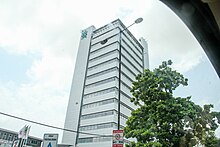
The government has majority control of university education. Tertiary education in Nigeria consists of Universities (Public and Private), Polytechnics, Monotechnics, and Colleges of education. The country has a total number of 129 universities registered by NUC among which federal and state government own 40 and 39 respectively while 50 universities are privately owned. In order to increase the number of universities in Nigeria from 129 to 138 the Federal Government gave 9 new private universities their licences in May 2015. The names of the universities that got licenses in Abuja included, Augustine University, Ilara, Lagos; Chrisland University, Owode, Ogun State; Christopher University, Mowe, Ogun State; Hallmark University, Ijebu-Itele, Ogun State; Kings University, Ode-Omu, Osun State; Micheal and Cecilia Ibru University, Owhrode, Delta State; Mountain Top University, Makogi/Oba Ogun state; Ritman University, Ikot-Epene, Akwa- Ibom State and Summit University, Offa, Kwara State.
First year entry requirements into most universities in Nigeria include: Minimum of SSCE/GCE Ordinary Level Credits at maximum of two sittings; Minimum cut-off marks in Joint Admission and Matriculation Board Entrance Examination (JAMB) of 180 and above out of a maximum of 400 marks are required. Candidates with minimum of Merit Pass in National Certificate of Education (NCE), National Diploma (ND) and other Advanced Level Certificates minimum qualifications with minimum of 5 O/L Credits are given direct entry admission into the appropriate undergraduate degree programs.
Students with required documents typically enter university from age 17-18 onwards and study for an academic degree.
Crime
Main article: Crime in Nigeria Further information: Corruption in Nigeria, Confraternities in Nigeria, Piracy in the Gulf of Guinea, and 419 Scams| This section needs expansion. You can help by making an edit requestadding to it . (April 2019) |
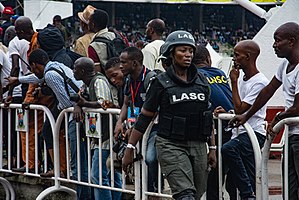
Nigeria is home to a substantial network of organised crime, active especially in drug trafficking. Nigerian criminal groups are heavily involved in drug trafficking, shipping heroin from Asian countries to Europe and America; and cocaine from South America to Europe and South Africa. Various Nigerian Confraternities or student "campus cults" are active in both organised crime and in political violence as well as providing a network of corruption within Nigeria. As confraternities have extensive connections with political and military figures, they offer excellent alumni networking opportunities. The Supreme Vikings Confraternity, for example, boasts that twelve members of the Rivers State House of Assembly are cult members.
On lower levels of society, there are the "area boys", organised gangs mostly active in Lagos who specialise in mugging and small-scale drug dealing. Gang violence in Lagos resulted in 273 civilians and 84 policemen killed in the period of August 2000 to May 2001.
Internationally, Nigeria is infamous for a form of bank fraud dubbed 419, a type of advance fee fraud (named after Section 419 of the Nigerian Penal Code) along with the "Nigerian scam", a form of confidence trick practised by individuals and criminal syndicates. These scams involve a complicit Nigerian bank (the laws being set up loosely to allow it) and a scammer who claims to have money he needs to obtain from that bank. The victim is talked into exchanging bank account information on the premise that the money will be transferred to them, and that they will get to keep a cut. In reality, money is taken out instead, and/or large fees (which seem small in comparison with the imaginary wealth he awaits) are deducted. In 2003, the Nigerian Economic and Financial Crimes Commission (or EFCC) was created, ostensibly to combat this and other forms of organised financial crime.
There is some major piracy in Nigeria, with attacks directed at all types of vessels. Consistent with the rise of Nigeria as an increasingly dangerous hot spot, 28 of the 30 seafarers kidnapped globally between January–June 2013 were in Nigeria.
Nigeria has been pervaded by political corruption. Nigeria was ranked 143 out of 182 countries in Transparency International's 2011 Corruption Perceptions Index; however, it improved to 136th position in 2014.
More than $400 billion were stolen from the treasury by Nigeria's leaders between 1960 and 1999. In late 2013, Nigeria's then central bank governor Lamido Sanusi informed President Goodluck Jonathan that the state oil company, NNPC, had failed to remit US$20 billion in oil revenues, which it owed the state. Jonathan, however, dismissed the claim and replaced Sanusi for alleged mismanagement of the central bank's budget. A Senate committee also found Sanusi's account to be lacking substance. After the conclusion of the NNPC's account audit, it was announced in January 2015 that NNPC's non-remitted revenue is actually US$1.48 billion, which it needs to refund back to the Government.
In 2015, Nigerian President Muhammadu Buhari stated that corrupt officials have stolen $150 billion from Nigeria in the last 10 years.
Tourism
Main article: Tourism in Nigeria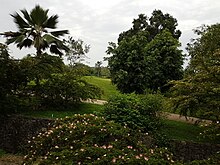
Tourism in Nigeria centers largely on events, due to the country's ample amount of ethnic groups, but also includes rain forests, savannah, waterfalls, and other natural attractions.

Abuja is home to several parks and green areas with the largest one being Millennium Park. Millennium Park was designed by architect Manfredi Nicoletti and was officially opened by the United Kingdom's Elizabeth II in December 2003. Another open area park is located in Lifecamp Gwarimpa; near the residence of the Minister of the Federal Capital Territory. The park is located on a slightly raised hilltop which contains sport facilities like Basketball and Badminton courts another park is the city park, it is located in wuse 2 and is home to numerous outdoor and indoor attractions such as a 4D cinema, astro-turf, lawn tennis court, paintball arena and a variety of restaurants.

Lagos, subsequent to the re-modernization project achieved by the previous administration of Governor Raji Babatunde Fashola, is gradually becoming a major tourist destination, being one of the largest cities in Africa and in the world. Lagos is currently taking steps to become a global city. The 2009 Eyo carnival (a yearly festival originated from Iperu Remo, Ogun State), which took place on 25 April, was a step toward world city status. Currently, Lagos is primarily known as a business-oriented and a fast-paced community.
Lagos has become an important location for African and "black" cultural identity. Lots of festivals are held in Lagos; festivals vary in offerings each year and may be held in different months. Some of the festivals are Festac Food Fair held in Festac Town Annually, Eyo Festival, Lagos Black Heritage Carnival, Lagos Carnival, Eko International Film Festival, Lagos Seafood Festac Festival, LAGOS PHOTO Festival and the Lagos Jazz Series, which is a unique franchise for high-quality live music in all genres with a focus on jazz. Established in 2010, the event takes place over a 3–5 day period at selected high quality outdoor venues. The music is as varied as the audience itself and features a diverse mix of musical genres from rhythm and blues to soul, Afrobeat, hip hop, bebop, and traditional jazz. The festivals provide entertainment of dance and song to add excitement to travelers during a stay in Lagos.
Lagos has a number of sandy beaches by the Atlantic Ocean, including Elegushi Beach and Alpha Beach. Lagos also has a number of private beach resorts including Inagbe Grand Beach Resort and several others in the outskirts.
Lagos has a variety of hotels ranging from three star to five star hotels, with a mixture of local hotels such as Eko Hotels and Suites, Federal Palace Hotel and franchises of multinational chains such as Intercontinental Hotel, Sheraton and Four Points by Hilton. Other places of interest include the Tafawa Balewa Square, Festac town, The Nike Art Gallery, Freedom Park, Lagos and the Cathedral Church of Christ, Lagos.
Culture
Main article: Culture of NigeriaLiterature
Main article: Nigerian literature
Nigerian citizens have authored many influential works of post-colonial literature in the English language. Nigeria's best-known writers are Wole Soyinka, the first African Nobel Laureate in Literature, and Chinua Achebe, best known for the novel Things Fall Apart (1958) and his controversial critique of Joseph Conrad.
Other Nigerian writers and poets who are well known internationally include John Pepper Clark, Ben Okri, Cyprian Ekwensi, Buchi Emecheta, Helon Habila, T. M. Aluko, Chimamanda Ngozi Adichie, Daniel O. Fagunwa, Femi Osofisan and Ken Saro Wiwa, who was executed in 1995 by the military regime. Nigeria has the second largest newspaper market in Africa (after Egypt) with an estimated circulation of several million copies daily in 2003.
Critically acclaimed writers of a younger generation include Adaobi Tricia Nwaubani, Chris Abani, Sefi Atta, Helon Habila, Helen Oyeyemi, Nnedi Okorafor, Kachi A. Ozumba, Sarah Ladipo Manyika, and Chika Unigwe.
Media
Main article: Media in NigeriaMusic and film
Main articles: Music of Nigeria, Cinema of Nigeria, and Festivals in Nigeria
Nigeria has had a huge role in the development of various genres of African music, including West African highlife, Afrobeat, Afrobeats, and palm-wine music, which fuses native rhythms with techniques that have been linked to the Congo, Brazil, Cuba, Jamaica and worldwide.
Many late 20th-century musicians such as Fela Kuti have famously fused cultural elements of various indigenous music with American jazz and soul to form Afrobeat which has in turn influenced hip hop music. JuJu music, which is percussion music fused with traditional music from the Yoruba nation and made famous by King Sunny Adé, is from Nigeria. Fuji music, a Yoruba percussion style, was created and popularised by Mr. Fuji, Alhaji Sikiru Ayinde Barrister.
Afan Music was invented and popularised by the Ewu-born poet and musician Umuobuarie Igberaese. There is a budding hip-hop movement in Nigeria. Kennis Music, the self-proclaimed number-one record label in Africa, and one of Nigeria's biggest record labels, has a roster almost entirely dominated by hip-hop artists.
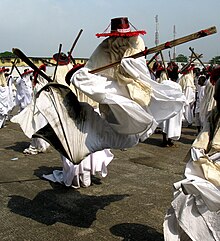
Notable musicians from Nigeria include: Sade Adu, King Sunny Adé, Onyeka Onwenu, Dele Sosimi, Adewale Ayuba, Ezebuiro Obinna, Alhaji Sikiru Ayinde Barrister, Bennie King, Ebenezer Obey, Umobuarie Igberaese, Femi Kuti, Lagbaja, Dr. Alban, Wasiu Alabi, Bola Abimbola, Zaki Adze, Tuface Idibia, Aṣa, Nneka, Wale, P Square and D'Banj.
In November 2008, Nigeria's music scene (and that of Africa) received international attention when MTV hosted the continent's first African music awards show in Abuja. Additionally, the very first music video played on MTV Base Africa (the 100th station on the MTV network) was Tuface Idibia's pan-African hit "African Queen".
The Nigerian film industry is known as Nollywood (a blend of Nigeria and Hollywood) and is now the 2nd-largest producer of movies in the world. Nigerian film studios are based in Lagos, Kano and Enugu, forming a major portion of the local economy of these cities. Nigerian cinema is Africa's largest movie industry in terms of both value and the number of movies produced per year. Although Nigerian films have been produced since the 1960s, the country's film industry has been aided by the rise of affordable digital filming and editing technologies.
The 2009 thriller film The Figurine is generally considered the game changer, which heightened the media attention towards New Nigerian Cinema revolution. The film was a critical and commercial success in Nigeria, and it was also screened in international film festivals. The 2010 film Ijé by Chineze Anyaene, overtook The Figurine to become the highest grossing Nigerian film; a record it held for four years, until it was overtaken in 2014 by Half of a Yellow Sun (2013). By 2016, this record was held by The Wedding Party, a film by Kemi Adetiba.
By the end of 2013, the film industry reportedly hit a record breaking revenue of ₦1.72 trillion (US$11 billion). As of 2014, the industry was worth ₦853.9 billion (US$5.1 billion) making it the third most valuable film industry in the world, behind the United States and India. It contributed about 1.4% to Nigeria's economy; this was attributed to the increase in the number of quality films produced and more formal distribution methods.
T.B. Joshua's Emmanuel TV, originating from Nigeria, is one of the most viewed television stations across Africa.
There are many festivals in Nigeria, some of which date to the period before the arrival of the major religions in this ethnically and culturally diverse society. The main Muslim and Christian festivals are often celebrated in ways that are unique to Nigeria or unique to the people of a locality. The Nigerian Tourism Development Corporation has been working with the states to upgrade the traditional festivals, which may become important sources of tourism revenue.
Cuisine
Main article: Cuisine of Nigeria
Nigerian cuisine, like West African cuisine in general, is known for its richness and variety. Many different spices, herbs and flavourings are used in conjunction with palm oil or groundnut oil to create deeply flavoured sauces and soups often made very hot with chili peppers. Nigerian feasts are colourful and lavish, while aromatic market and roadside snacks cooked on barbecues or fried in oil are plentiful and varied.
Sport
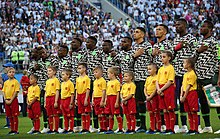
Football is largely considered Nigeria's national sport and the country has its own Premier League of football. Nigeria's national football team, known as the "Super Eagles", has made the World Cup on Six occasions 1994, 1998, 2002, 2010, 2014, and most recently in 2018. In April 1994, the Super Eagles ranked 5th in the FIFA World Rankings, the highest ranking achieved by an African football team. They won the African Cup of Nations in 1980, 1994, and 2013, and have also hosted the U-17 & U-20 World Cup. They won the gold medal for football in the 1996 Summer Olympics (in which they beat Argentina) becoming the first African football team to win gold in Olympic Football.
The nation's cadet team from Japan '93 produced some international players notably Nwankwo Kanu, a two-time African Footballer of the year who won the European Champions League with Ajax Amsterdam and later played with Inter Milan, Arsenal, West Bromwich Albion and Portsmouth. Other players that graduated from the junior teams are Nduka Ugbade, Jonathan Akpoborie, Victor Ikpeba, Celestine Babayaro, Wilson Oruma and Taye Taiwo. Some other famous Nigerian footballers include John Obi Mikel, Obafemi Martins, Vincent Enyeama, Yakubu, Rashidi Yekini, Peter Odemwingie and Jay-Jay Okocha.

According to the official May 2010 FIFA World Rankings, Nigeria was the second top-ranked football nation in Africa and the 21st highest in the world. Nigeria is also involved in other sports such as basketball, cricket and track and field. Boxing is also an important sport in Nigeria; Dick Tiger and Samuel Peter are both former World Champions.
Nigeria's national basketball team made the headlines internationally when it qualified for the 2012 Summer Olympics as it beat heavily favoured world elite teams such as Greece and Lithuania. Nigeria has been home to numerous internationally recognised basketball players in the world's top leagues in America, Europe and Asia. These players include Basketball Hall of Famer Hakeem Olajuwon, and later NBA draft picks Solomon Alabi, Yinka Dare, Obinna Ekezie, Festus Ezeli, Al-Farouq Aminu and Olumide Oyedeji.
Nigeria made history by qualifying the first bobsled team for the Winter Olympics from Africa when their Women's 2-man team qualified for the bobsled competition at the XXIII Olympic Winter Games in Pyeongchang, South Korea.
In the early 1990s, Scrabble was made an official sport in Nigeria. By the end of 2017, there were around 4,000 players in more than 100 clubs in the country. In 2015, Wellington Jighere became the first African player to win World Scrabble Championship.
Social issues
Despite its vast government revenue from the mining of petroleum, Nigeria faces a number of societal issues, owing primarily to a history of inefficiency in its governance.
Human rights
Main articles: Human rights in Nigeria and LGBT rights in Nigeria
Nigeria's human rights record remains poor; according to the US Department of State, the most significant human rights problems are: use of excessive force by security forces; impunity for abuses by security forces; arbitrary arrests; prolonged pretrial detention; judicial corruption and executive influence on the judiciary; rape, torture and other cruel, inhuman or degrading treatment of prisoners, detainees and suspects; harsh and life‑threatening prison and detention centre conditions; human trafficking for the purpose of prostitution and forced labour; societal violence and vigilante killings; child labour, child abuse and child sexual exploitation; domestic violence; discrimination based on ethnicity, region and religion.
Under the Shari'a penal code that applies to Muslims in twelve northern states, offences such as alcohol consumption, homosexuality, infidelity and theft carry harsh sentences, including amputation, lashing, stoning and long prison terms. According to 2013 survey by the Pew Research Center, 98% of Nigerians believe that homosexuality should not be accepted by society.
Under a law signed in early 2014, same-sex couples who marry face up to 14 years each in prison. Witnesses or anyone who helps gay couples marry will be sentenced to 10 years behind bars. The bill also punishes the "public show of same-sex amorous relationships directly or indirectly" with ten years in prison. Another portion of the bill mandates 10 years in prison for those found guilty of organising, operating or supporting gay clubs, organizations and meetings.
In the Nigerian state of Akwa Ibom, about 15,000 children were branded as witches; most of them ended up abandoned and abused on the streets.
Strife and sectarian violence
See also: Conflict in the Niger Delta, Religious violence in Nigeria, and Herder—farmer conflict in central Nigeria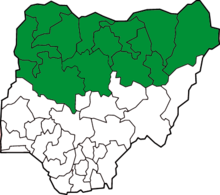
Because of its multitude of diverse, sometimes competing ethno-linguistic groups, Nigeria prior to independence was faced with sectarian tensions and violence, particularly in the oil-producing Niger Delta region, where both state and civilian forces employ varying methods of coercion in attempts to gain control over regional petroleum resources. Some of the ethnic groups like the Ogoni, have experienced severe environmental degradation due to petroleum extraction.
Since the end of the civil war in 1970, some ethnic violence has persisted. There has subsequently been a period of relative harmony since the Federal Government introduced tough new measures against religious violence in all affected parts of the country. The 2002 Miss World pageant was moved from Abuja to London in the wake of violent protests by Muslims in the Northern part of the country that left more than 100 people dead and over 500 injured. The rioting erupted after Muslims in the country reacted in anger to comments made by a newspaper reporter. Muslim rioters in Kaduna killed an estimated 105 men, women, and children with a further 521 injured taken to hospital.
Since 2002, the country has seen sectarian violence by Boko Haram, an Islamist movement that seeks to abolish the secular system of government and establish Sharia law in the country. In the 2010 Jos riots, more than 500 people were killed by Muslim religious violence.
Nigerian President Goodluck Jonathan in May 2014 claimed that Boko Haram attacks have left at least 12,000 people dead and 8,000 people crippled. In May 2014 Benin, Chad, Cameroon and Niger joined Nigeria in a united effort to combat Boko Haram in the aftermath of the 2014 Chibok kidnapping of 276 schoolgirls.
In April 2016, over 500 people in ten villages in predominantly Christian areas in Agatu were murdered by Fulani herdsmen. A visiting Nigerian Senator reported that all the primary and post-primary schools, health centres, worship centres as well as the police station in the area were destroyed. The UNHCR representative said in 20 years of work, she had "never seen such a level of destruction". 130 Fulani adults and children were massacred in the Kaduna State in February 2019.
Media representation
- Drilling and Killing: Chevron and Nigeria's Oil Dictatorship, an audio documentary produced by Amy Goodman first aired in 1998 on Democracy Now!.
- Sweet Crude, a documentary film produced and directed by Sandy Cioffi about Nigeria's oil-rich Niger Delta.
- Poison Fire, a documentary exposing oil and gas abuses in Nigeria, featuring Friends of the Earth Nigeria volunteers, which premiered at the International Documentary Film Festival Amsterdam.
- Nollywood Babylon, a 2008 documentary by Montrealers Ben Addelman and Samir Mallal about the Nigerian film industry, Nollywood. It premiered at the Festival de nouveau cinéma de Montréal 2008.
Women's rights
Main article: Women in Nigeria Further information: Child marriage in Nigeria, Polygamy in Nigeria, Child sexual abuse in Nigeria, Gender inequality in Nigeria, Domestic violence in Nigeria, Female genital mutilation in Nigeria, and Girl child labour in Nigeria
Nigeria is a state party of the Convention on the Elimination of All Forms of Discrimination Against Women It also has signed Maputo Protocol, an international treaty on women's rights, and the African Union Women's Rights Framework. Discrimination based on sex is a significant human rights issue, however. Forced marriages are common.
Child marriage remains common in Northern Nigeria. 39% of girls are married before age 15, although the Marriage Rights Act banning marriage of girls below 18 years of age was introduced on a federal level in 2008.
There is polygamy in Nigeria. Submission of the wife to her husband and domestic violence are common. Women have less land rights. Maternal mortality was at 814 per 100,000 live births in 2015. Female genital mutilation is common. In 2015, there was a federal ban.
In Nigeria, at least half a million suffer from vaginal fistula, largely as a result of lack of medical care. Early marriages can result in fistula. Most workers in the informal sector are women.
See also
References
- "Languages of Nigeria". Ethnologue. Retrieved 12 September 2010.
- "UN Projection", World Population Prospects 2017
- ^ "World Economic Outlook Database, October 2018 – Nigeria". International Monetary Fund. Retrieved 20 October 2018.
- "Gini Index". World Bank. Retrieved 2 March 2011.
- "2018 Human Development Report". United Nations Development Programme. 2018. Retrieved 14 September 2018.
- "Nigerian Constitution". Nigeria Law. Retrieved 17 July 2015.
- ^ Nossiter, Adam (16 April 2011). "Nigerians Vote in Presidential Election". The New York Times. Retrieved 17 April 2011.
- Nigeria: Giant of Africa, by Peter Holmes 1987
- The CIAWorld Fact Book 2014. Skyhorse Publishing, Inc. 2013. ISBN 978-1-62636-073-0.
- Library of Congress – Federal Research Division (July 2008). "Country profile: Nigeria" (PDF): 9. Retrieved 28 December 2011.
{{cite journal}}: Cite journal requires|journal=(help) - ^ "Nigeria Fact Sheet" (PDF). United States Embassy in Nigeria. Retrieved 23 September 2018.
- "Ethnicity in Nigeria". PBS. 5 April 2007. Retrieved 9 May 2015.
- "Nigeria". Ethnologue. Retrieved 4 July 2019.
- "Linguistic diversity in Africa and Europe - Languages Of The World". 16 June 2011. Archived from the original on 15 September 2017. Retrieved 4 July 2019.
- "Nigeria becomes Africa's largest economy". Retrieved 5 April 2014.
- "Nigerian Economy Overtakes South Africa's on Rebased GDP". Retrieved 20 April 2014.
- "UPDATE 2-Nigeria surpasses South Africa as continent's biggest economy". Retrieved 26 April 2014.
- "Nigeria". World Bank. Retrieved 28 November 2013.
- "Nigeria is poised to become Africa's most powerful nation". Archived from the original on 3 December 2013. Retrieved 28 November 2013.
- "Nigeria". West Africa Gateway. Archived from the original on 3 December 2013. Retrieved 25 August 2013.
- "Nigeria" (PDF). Retrieved 28 November 2013.
- Andrew F. Cooper, Agata Antkiewicz and Timothy M. Shaw, 'Lessons from/for BRICSAM about South-North Relations at the Start of the 21st Century: Economic Size Trumps All Else?', International Studies Review, Vol. 9, No. 4 (Winter, 2007), pp. 675, 687.
- Meltem Myftyler and Myberra Yyksel, 'Turkey: A Middle Power in the New Order', in Niche Diplomacy: Middle Powers After the Cold War, edited by Andrew F. Cooper (London: Macmillan, 1997).
- Mace G, Belanger L (1999) The Americas in Transition: The Contours of Regionalism (p. 153)
- Solomon S (1997) South African Foreign Policy and Middle Power Leadership Archived 26 April 2015 at the Wayback Machine, ISS
- "Nigeria, an Emerging African Power". BET. 20 July 2011. Retrieved 27 April 2015.
- "MINT Countries: Nigeria Now Listed Among Emerging World Economic Powers!". The Street Journal. 7 January 2014. Retrieved 27 April 2015.
- "The Mint countries: Next economic giants?". BBC. 6 January 2014. Retrieved 27 April 2015.
- The Arabic name nahr al-anhur is a direct translation of the Tuareg.
- "Online Etymological Dictionary". Etymonline.com. Retrieved 28 July 2014.
- Breunig, Peter. 2014. Nok: African Sculpture in Archaeological Context: p. 21.
- Nicole Rupp, Peter Breunig & Stefanie Kahlheber, "Exploring the Nok Enigma", Antiquity 82.316, June 2008.
- B.E.B. Fagg, "The Nok Culture in Prehistory", Journal of the Historical Society of Nigeria 1.4, December 1959.
- Kleiner, Fred S.; Christin J. Mamiya (2009). Gardner's Art Through the Ages: Non-Western Perspectives (13, revised ed.). Cengage Learning. p. 194. ISBN 978-0-495-57367-8.
- "Nok Terracottas (500 B.C.–200 A.D.) | Thematic Essay | Heilbrunn Timeline of Art History | The Metropolitan Museum of Art". Metmuseum.org. 2 June 2014. Retrieved 16 July 2014.
- Cite error: The named reference
millerwas invoked but never defined (see the help page). - Cite error: The named reference
Stuiverwas invoked but never defined (see the help page). - Tylecote 1975 (see below)
- Eggert, Manfred (2014). "Early iron in West and Central Africa". In Breunig, P (ed.). Nok: African Sculpture in Archaeological Context. Frankfurt, Germany: Africa Magna Verlag Press. pp. 51–59.
- Eggert, Manfred (2014). "Early iron in West and Central Africa". In Breunig, P (ed.). Nok: African Sculpture in Archaeological Context. Frankfurt, Germany: Africa Magna Verlag Press. pp. 53–54.
- Eze–Uzomaka, Pamela. "Iron and its influence on the prehistoric site of Lejja". Academia.edu. University of Nigeria,Nsukka, Nigeria. Retrieved 12 December 2014.
- ^ Cite error: The named reference
Holl-2009was invoked but never defined (see the help page). - ^ Juang, Richard M. (2008). Africa and the Americas: culture, politics, and history : a multidisciplinary encyclopedia, Volume 2. ABC-CLIO. p. 597. ISBN 978-1-85109-441-7.
- Hrbek, Ivan (1992). Africa from the seventh to the eleventh Century. James Currey Publishers. p. 254. ISBN 978-0-85255-093-9.
- Uzukwu, E. Elochukwu (1997). Worship as Body Language. Liturgical Press. p. 93. ISBN 978-0-8146-6151-2.
- ^ Falola, Toyin; Heaton, Matthew M. (2008). A History of Nigeria. Cambridge University Press. p. 23. ISBN 978-0-521-68157-5.
- Laitin, David D. (1986). Hegemony and culture: politics and religious change among the Yoruba. University of Chicago Press. p. 111. ISBN 978-0-226-46790-0.
- MacDonald, Fiona; Paren, Elizabeth; Shillington, Kevin; Stacey, Gillian; Steele, Philip (2000). Peoples of Africa, Volume 1. Marshall Cavendish. p. 385. ISBN 978-0-7614-7158-5.
- Metz, Helen Chapin (1991). "Nigeria: A Country Study – The Slave Trade". Library of Congress Country Studies. Retrieved 28 May 2011.
- Abba Idris Adam, "Re-inventing Islamic Civilization in the Sudanic Belt: The Role of Sheikh Usman Dan Fodio." Journal of Modern Education Review 4.6 (2014): 457-465. online
- Description de l'Afrique ... Traduite du Flamand (Amsterdam, 1686; 1st ed., 1668), between pp. 320 and 321. (Library of Congress, Prints and Photographs Division, LC-USZ62-30841).
- ^ Gordon, April A. (2003). Nigeria's Diverse Peoples: A Reference Sourcebook. ABC-CLIO. pp. 44–54. ISBN 978-1-57607-682-8. Retrieved 29 March 2015.
- ^ Falola, Toyin; Genova, Ann (2009). Historical Dictionary of Nigeria. Scarecrow Press. p. 328. ISBN 978-0-8108-6316-3. Retrieved 29 March 2015.
- Falola, Toyin; Paddock, Adam (2012). Environment and Economics in Nigeria. Routledge. p. 78. ISBN 978-1-136-66247-8. Retrieved 29 March 2015.
- "Slavery – Historical survey – Slave societies". Encyclopædia Britannica. 2011. Retrieved 28 May 2011.
{{cite web}}: Unknown parameter|encyclopedia=ignored (help) - Kevin Shillington, Encyclopedia of African History. (U of Michigan Press, 2005) p. 1401.
- Derek R. Peterson, ed., Abolitionism and imperialism in Britain, Africa, and the Atlantic (Ohio UP, 2010).
- Toyin Falola and Matthew M. Heaton, A History of Nigeria (2008) pp 85-109.
- Garba, Safiya J., "The Impact of Colonialism on Nigerian Education and the Need for E-Learning Technique for Sustainable Development", Journal of Education and Social Research, MCSER-Mediterranean Center of Social and Educational Research (Rome; Vol. 2 (7) October 2012); p. 56 (ISSN 2239-978X)
- "The end of slavery". The Story of Africa. BBC News. Retrieved 28 May 2011.
- Falola and Heaton, A History of Nigeria (2008) pp 136-57.
- Udofia, O.E. (1981). "Nigerian Political Parties: Their Role in Modernizing the Political System, 1920–1966". Journal of Black Studies. 11 (4): 435–447. doi:10.1177/002193478101100404. JSTOR 2784073.
- Falola and Heaton, A History of Nigeria (2008) pp 158-59.
- Murray, Senan (30 May 2007). "Reopening Nigeria's civil war wounds". BBC News. Retrieved 28 May 2011.
- "Background Paper on Nigeria and Biafra, Declassified Documents reference System.
- Metz, Helen Chapin (1991). "Nigeria: A Country Study – Civil War". Library of Congress Country Studies. Retrieved 28 May 2011.
- "The Biafra War and the Age of Pestilence". Litencyc.com. Retrieved 28 July 2014.
- Michael I. Draper, Shadows : Airlift and Airwar in Biafra and Nigeria 1967–1970.
- Watts, Michael (1987) State, Oil and Agriculture in Nigeria, Institute of International Studies, University of California, ISBN 0-87725-166-5.
- David Williams, President and power in Nigeria: The life of Shehu Shagari (Routledge, 2018).
- Nnamdi J.O. Ijeaku (2009). The Igbo and their Niger Delta Neighbors: We Are No Second Fools. Xlibris. p. 193. ISBN 978-1-4628-0861-8.
- "Nigeria, Military Faces Daunting Challenges", AP Press International, 3 March 1984. Retrieved 22 February 2007.
- "Nigeria stays calms as leader toppled in bloodless coup", The Globe and Mail, 28 August 1985. Retrieved 22 February 2007.
- Holman, Michael (24 February 1986) "Nigeria, Politics; Religious Differences Intensify", Financial Times
- Elections in Nigeria at African Elections Database
- Bilski, Andrew, "Broken Promises", Maclean, 6 September 1993.
- Diamond, Larry; Kirk-Greene, Anthony; Oyeleye Oyediran (1997) Transition without End: Nigerian Politics and Civil Society Under Babangida, Vantage Publishers, ISBN 978-2458-54-6.
- "Wiwa et al v. Royal Dutch Petroleum et al". Center for Constitutional Rights.
- "Nigerian Lawyer: Abacha accounts apparently in Switzerland, Luxembourg, France, and Germany", AP press, 10 January 2000.
- "Abdusalam Abubakar", Encyclopædia Britannica Online, accessed 26 October 2012.
- Falola and Heaton, A History of Nigeria (2008) pp 211-34.
- "Final Report" (PDF). EU Election Observation Mission Nigeria 2007. Archived from the original (PDF) on 16 February 2008. Retrieved 24 January 2008.
- "Nigeria's Goodluck Jonathan sworn in as president". BBC News. 6 May 2010. Retrieved 28 May 2011.
- "NASS confirms Sambo as vice president". The Nigerian Voice. 18 May 2010. Retrieved 29 May 2011.
- Akinlade, Muruf (18 May 2010). "National Assembly confirms Sambo as Vice President". MyOndoState.Com. Archived from the original on 27 April 2011. Retrieved 29 May 2011.
- Purefoy, Christian. "Goodluck Jonathan retains Nigerian presidency". CNN. Archived from the original on 22 April 2011. Retrieved 11 April 2011.
- "Nigeria election: Muhammadu Buhari wins". BBC. Retrieved 31 March 2015.
- "Obama praises Nigeria's president for conceding defeat". Vanguard. 1 April 2015. Retrieved 4 April 2015.
- "APC praises Jonathan for conceding defeat". The Nation. Retrieved 4 April 2015.
- "Anyaoku Praises Jonathan For Conceding Defeat". Channels Television. 31 March 2015. Retrieved 4 April 2015.
- Charles Mwalimu. The Nigerian Legal System: Public Law. Peter Lang. 2005. p. 6.
- ^ "Nigeria". The World Factbook. Central Intelligence Agency (United States).
- Johnson Aguiyi-Ironsi, who served briefly as Nigeria's second president, devoted his government to combating this phenomenon with Decree 33, which banned 81 political parties and 26 tribal and cultural organizations in the name of national unity. See Osaghae, The Crippled Giant: Nigeria Since Independence, Indiana University Press, 1998, p. 57. ISBN 0-253-21197-2.
- ^ Rashid, Khadijat K. (2003). "Ethnicity and Sub-Nationalism in Nigeria: Movement for a Mid-West State/Ethnic Politics in Kenya and Nigeria/Federalism and Ethnic Conflict in Nigeria". African Studies Review. 46 (2).
- Lancia, Nicole. "Ethnic Politics in Nigeria: The Realities of Regionalism". Georgetown University. Archived from the original on 8 February 2012. Retrieved 28 May 2011.
- McGreal, Chris (24 April 2007). "Ruling party named winner in disputed Nigerian election". The Guardian. London. Retrieved 21 November 2008.
- Ibrahim, Jibrin (2006) "Legislation and the Electoral Process: The Third Term Agenda and the Future of Nigerian Democracy". Paper for Centre for Democracy and Development (CDD) Nigeria Roundtable.
- "Nigeria has lost $400bn oil revenue to corruption since Independence – Ezekwesili". Daily Post Nigeria. 31 August 2012.
- Nmehielle, Vincent Obisienunwo Orlu (August 2004). "Sharia Law in the Northern States of Nigeria: To Implement or Not to Implement, the Constitutionality is the Question". Human Rights Quarterly. 26 (3): 730–759. doi:10.1353/hrq.2004.0039.
- Young, Andrew (20 July 2006) "Collins Edomaruse, how Obasanjo cut UK, US to size", This Day (Nigeria).
- Burkett, Elinor (2009) Golda, HarperCollins, ISBN 0-06-187395-0, p. 202.
- "ASAS – Africa-South America Summit". African Union. 30 November 2006. Archived from the original on 18 May 2011. Retrieved 29 May 2011.
- Timothy, Shaw (1984). "The State of Nigeria: Oil Prices Power Bases and Foreign Policy". Canadian Journal of African Studies. 18 (2): 393–405. doi:10.2307/484337. JSTOR 484337.
- "Egbe Omo Yoruba, National Association of Yoruba descendants in North America". yorubanation.org. 19 May 2007. Archived from the original on 9 March 2018. Retrieved 29 May 2011.
- "Which Countries Are For or Against China's Xinjiang Policies?". The Diplomat. 15 July 2019.
- O'Loughlin, Ed (11 March 1998) "Nigerians outshine the British brass", The Independent (London)
- "Chapter XXVI: Disarmament – No. 9 Treaty on the Prohibition of Nuclear Weapons". United Nations Treaty Collection. 7 July 2017.
- "Rank Order – Area". The World Factbook. Central Intelligence Agency. Retrieved 29 May 2011.
- "Africa :: Nigeria". The World Factbook. Central Intelligence Agency. 17 May 2011. Retrieved 29 May 2011. *Note that coastlines, and borders based on rivers or natural features, are fractals, the length of which is imprecise and depends on the measurement convention adopted.
- ^ "Regions Used to Interpret the Complexity of Nigeria". Geographical Alliance of Iowa. University of Northern Iowa. Archived from the original on 14 April 2009. Retrieved 19 July 2007.
- ^ "Nigeria". Encarta. Microsoft. Archived from the original on 11 November 2003. Retrieved 19 July 2007.
- ^ "The Human and Physical Characteristics of Nigeria". Geographical Alliance of Iowa. University of Northern Iowa. Archived from the original on 28 March 2010. Retrieved 13 August 2007.
- Ogbonna, D.N.; Ekweozor, I.K.E.; Igwe, F.U. (2002). "Waste Management: A Tool for Environmental Protection in Nigeria". AMBIO: A Journal of the Human Environment. 31 (1): 55–57. doi:10.1639/0044-7447(2002)031[0055:wmatfe]2.0.co;2. JSTOR 4315211.
- "News.mongabay.com". News.mongabay.com. Retrieved 28 July 2014.
- "Rainforest analysis at Mongabay.com". Rainforests.mongabay.com. 1 January 2010. Retrieved 28 July 2014.
- Bashir, Muhammed; Umar-Tsafe, Nasir; Getso, Kabiru; Kaita, Ibrahim M.; Nasidi, Abdulsalami; Sani-Gwarzo, Nasir; Nguku, Patrick; Davis, Lora; Brown, Mary Jean (18 April 2014). "Assessment of blood lead levels among children aged ≤ 5 years—Zamfara State, Nigeria, June–July 2012". MMWR. Morbidity and Mortality Weekly Report. 63 (15): 325–327. ISSN 1545-861X. PMC 5779393. PMID 24739340.
- "Constitution amendment: What the people want". 4 November 2012. Retrieved 14 December 2012.
- "Constitutional review: Nigeria needs broader representation". 6 December 2012. Archived from the original on 11 May 2013. Retrieved 14 December 2012.
- ^ Onuah, Felix (29 December 2006). "Nigeria gives census result, avoids risky details". Reuters. Retrieved 23 November 2008.
- "World Bank list of economies". http: www.worldbank.org. January 2011. Archived from the original on 22 May 2011. Retrieved 27 May 2011.
- "5. Report for Selected Countries and Subjects". World Bank. April 2015. Retrieved 21 September 2017.
- "Nigeria (07/08)". State.gov. Retrieved 21 November 2008.
- "IMF Survey: Nigeria Needs Sustained Reforms to Build on Success". Imf.org. Retrieved 21 November 2008.
- Aminu, Ayodele (13 April 2008). "allAfrica.com: Africa: IMF Forecasts 9 Percent Growth for Nigeria (p. 1 of 1)". Allafrica.com.
- Godwin, Atser (29 February 2008). "The Punch: IMF predicts 9% GDP growth rate for Nigeria". Punchng.com. Archived from the original on 11 May 2011.
- Odueme, Stella (9 May 2011). "RenCap projects 8% growth for Nigeria in 2011". Independentngonline.com. Archived from the original on 22 July 2011. Retrieved 28 May 2011.
- "FORGET THE BRICs: Citi's Willem Buiter Presents The 11 "3G" Countries That Will Win The Future". businessinsider.com. 22 February 2011. Retrieved 31 May 2011.
- "Labour Force Statistics, 2010". Nigerian Bureau of Statistics. 2010. Archived from the original on 24 April 2015. Retrieved 22 June 2015.
- Ake, Claude (1996). Democracy and Development in Africa. Brookings Institution Press. p. 48. ISBN 978-0-8157-0220-7. Retrieved 26 December 2008.
- ^ "Agriculture – Nigeria – export, growth, area, crops, farming, sector". Retrieved 17 April 2015.
- Pasquini, MW; Alexander, MJ (2005). "Soil fertility management strategies on the Jos Plateau: the need for integrating 'empirical' and 'scientific' knowledge in agricultural development". Geographical Journal. 171 (2): 112–124. doi:10.1111/j.1475-4959.2005.00154.x.
- "Nigeria closes part of border with Benin to check rice smuggling". Reuters. 29 August 2019. Retrieved 29 August 2019.
- Williams, Lizzie (2008). Nigeria: The Bradt Travel Guide. Bradt Travel Guides. p. 26. ISBN 978-1-84162-239-2. Retrieved 26 December 2008.
- Nelson, P.H.H., Role of Reflection Seismic in Development of Nembe Creek Field, Nigeria, 1980, in Giant Oil and Gas Fields of the Decade: 1968–1978, AAPG Memoir 30, Halbouty, M.T., editor, Tulsa: American Association of Petroleum Geologists, ISBN 0-89181-306-3, pp. 565–576
- "Stakes in four Nigerian oil fields being sold by Shell". Nigeria Sun. 27 August 2014. Retrieved 28 August 2014.
- Environmental Resources Managers Ltd, Niger Delta Environmental Survey Final Report Phase I; Volume I: Environmental and Socio-Economic Characteristics (Lagos: Niger Delta Environmental Survey, September 1997)
- Nigeria: The Political Economy of Oil ISBN 0-19-730014-6 (Khan, Ahmad)
- ^ Gbola Subair- Abuja (8 September 2014). "Remittances from diaspora Nigerians as lubricant for the economy". Nigerian Tribune. Archived from the original on 17 March 2015. Retrieved 17 April 2015.
- DeRouen, Karl R.; Bellamy, Paul (2008). International Security and the United States: An Encyclopedia. Greenwood Publishing Group. p. 546. ISBN 978-0-275-99253-8. Retrieved 26 December 2008.
{{cite book}}: Unknown parameter|lastauthoramp=ignored (|name-list-style=suggested) (help) - Lewis, Peter (2007). Growing Apart: Oil, Politics, and Economic Change in Indonesia and Nigeria. University of Michigan Press. p. 168. ISBN 978-0-472-06980-4. Retrieved 26 December 2008.
- Safire, William, The New York Times (2007). The New York Times Guide to Essential Knowledge: A Desk Reference for the Curious Mind. Macmillan. p. 1093. ISBN 978-0-312-37659-8.
- "Innoson cars will sell for N1 million in 2014 – Chukwuma". The Abuja Inquirer. Retrieved 14 March 2014.
- Okonji, Emma (24 October 2013). "Zinox Introduces Tablet Range of Computers, Plans Commercial Launch". This Day. This Day Live. Archived from the original on 27 October 2013. Retrieved 14 March 2014.
- Onuba, Ifeanyi (4 October 2014). "FG raises tariff on imported cars". Punch Newspaper. Punch NG. Archived from the original on 27 November 2013. Retrieved 14 March 2014.
- Clement, Udeme (19 January 2014). "Will the new automotive policy give us affordable made-in-Nigeria car?". Vanguard. Vanguard Nigeria. Retrieved 14 March 2014.
- Agande, Ben (24 January 2014). "Nissan to role out 1st made in Nigeria cars in April". Vanguard, Nigeria. Vanguard. Retrieved 14 March 2014.
- "Industrial hub: Why more companies are moving to Ogun". Vanguard Nigeria. 19 June 2013. Retrieved 14 March 2014.
- "Ogun State's rising investment profile". Daily NewsWatch. 5 May 2013. Archived from the original on 14 March 2014. Retrieved 14 March 2014.
- "Ogun State: Nigeria's new Industrial hub". Online Nigeria News. 27 November 2012. Retrieved 14 March 2014.
- "'Technical problems' shut down Nigerian satellite". AFP. 12 November 2008. Archived from the original on 4 January 2011.
- "Nigcomsat-1 Program – In-Orbit Delivery Program – Communications Satellite – CGWIC".
- "Nigcomsat-1 Program – In-Orbit Delivery Program – Communications Satellite". CGWIC. Retrieved 21 December 2010.
- "Nigeria Launches Satellite in China". African Spotlight. Archived from the original on 14 February 2012. Retrieved 10 March 2012.
- ^ CO2 Emissions from Fuel Combustion Population 1971–2008 IEA pdf Archived 6 January 2012 at the Wayback Machine pp. 83–85
- ^ "Human Development Data (1990-2017)". United Nations Development Programme. United Nations Development Programme. Retrieved 17 October 2018.
- "People and Society: Population". The World Fact Book. Central Intelligence Agency. Retrieved 17 October 2018.
- "World Population Prospects 2022". United Nations Department of Economic and Social Affairs, Population Division. Retrieved 17 July 2022.
- "World Population Prospects 2022: Demographic indicators by region, subregion and country, annually for 1950-2100" (XSLX) ("Total Population, as of 1 July (thousands)"). United Nations Department of Economic and Social Affairs, Population Division. Retrieved 17 July 2022.
- Nigerian President Goodluck Jonathan urges birth control retrieved 2 July 2012
- "World Population TO INCREASE BY 2.6 BILLION OVER NEXT 45 YEARS, WITH ALL GROWTH OCCURRING IN LESS DEVELOPED REGIONS". UN. Retrieved 21 November 2008.
- "Population Division of the Department of Economic and Social Affairs of the United Nations Secretariat". UN. 2010. Archived from the original on 11 June 2011. Retrieved 27 May 2011.
- Kent, Mary Mederios; Carl Haub (December 2005). "The Demographic Divide: What It Is and Why It Matters". Population Reference Bureau. Archived from the original on 26 April 2011. Retrieved 6 June 2011.
- "The 10 Most Populated Countries in Africa". Retrieved 30 March 2019.
- "People and Society: Population". The World Fact Book. Central Intelligence Agency. Retrieved 17 October 2018.
- McDonald, John F.; Daniel P. McMillen (2010). Urban Economics and Real Estate: Theory and Policy. Wiley Desktop Editions (2 ed.). John Wiley & Sons. p. 9. ISBN 978-0-470-59148-2.
- ^ "Major Urban Areas: Population". The World Fact Book. Central Intelligence Agency. Retrieved 17 October 2018.
- "Nigeria" in Geographica: The complete Atlas of the world, Random House, 2002, ISBN 0-375-72037-5
- Lewis, Peter (2007). Growing Apart: Oil, Politics, and Economic Change in Indonesia and Nigeria. University of Michigan Press. p. 132. ISBN 978-0-472-06980-4.
- Suberu, Rotimi T. (2001). Federalism and Ethnic Conflict in Nigeria. US Institute of Peace Press. p. 154. ISBN 978-1-929223-28-2.
- Politzer, Malia (August 2008). "China and Africa: Stronger Economic Ties Mean More Migration". Migration Information Source. Retrieved 7 June 2011.
- Simpson, Sarah (August 2008). "Why white Zimbabwean farmers plan to stay in Nigeria". The Christian Science Monitor. Retrieved 7 June 2011.
- Toyin Falola, The History of Nigeria, Greenwood Press, 1999, pp. 41, 47.
- Abiola Dosumu Elegbede-Fernandez, Lagos A Legacy of Honour. Spectrum Books, 1992, pp. 19, 27.
- Adegbija, Efurosibina E. (2003). Multilingualism: A Nigerian Case Study. Last paragraph: Africa World Press. p. 55. ISBN 978-1-59221-173-9. Retrieved 26 December 2008.
- ^ CIA Factbook : Nigeria (Retrieved 1 May 2019)
- Chitando, Ezra (editor: Afe Adogame), African Traditions in the Study of Religion, Diaspora and Gendered Societies, Routledge (2016), p. 31, ISBN 9781317184188
- "Percentages By Religion of the 1952 and 1963 Populations of Nigeria's Present 36 States" (PDF).
{{cite web}}: CS1 maint: url-status (link) - Owobi Angrew, "Tiptoeing Through A Constitutional Minefield: The Great Sharia Controversy in Nigeria", Journal of African Law, Vol. 48, No 2, 2002.
- "Kano Seeks Supremacy of Sharia Over Constitution". wwrn.org. 17 March 2005. Retrieved 7 June 2011.
- "Diversity in Nigerian Islam" (PDF). Retrieved 15 April 2014.
- "The Bahá'í Community of Nigeria". Retrieved 15 August 2018.
- "Nigeria". U.S. Department of State.
- "Religions". CIA World Factbook. Retrieved 1 July 2013.
- "Table: Religious Composition by Country, in Percentages". Pew Research Center's Religion & Public Life Project. 18 December 2012. Archived from the original on 1 January 2013.
- "The countries with the 10 largest Christian populations and the 10 largest Muslim populations".
{{cite web}}: CS1 maint: url-status (link) - "Religious Adherents, 2010 – Nigeria". World Christian Database. Retrieved 28 July 2013.
- "Regional Distribution of Christians". Pewforum.org. Retrieved 28 July 2014.
- "Distribution of Christians".
- "The Future of the Global Muslim Population". Pewforum.org. Retrieved 28 July 2014.
- "Table: Christian Population in Numbers by Country | Pew Research Center's Religion & Public Life Project". Features.pewforum.org. 19 December 2011. Archived from the original on 7 January 2012. Retrieved 16 July 2014.
- "Nigeria: a secular or multi religious state – 2". Archived from the original on 6 March 2014. Retrieved 15 April 2014.
- "The Middle Belt: History and politics". Nasarawastate.org. 29 November 2004. Archived from the original on 29 February 2012. Retrieved 13 March 2012.
- "The Middle Belt Movement and the Formation of Christian Consciousness in Colonial Northern Nigeria. -- Britannica Online Encyclopedia". 26 November 2009. Archived from the original on 26 November 2009.
- "Young Nigerians are connecting with Pentecostal churches. Will they return to Catholicism?". America Magazine. 16 November 2017. Retrieved 19 March 2018.
- Hackett, Rosalind I.J. (1988). "The Academic Study of Religion in Nigeria". Religion. 18: 37–46. doi:10.1016/S0048-721X(88)80017-4.
- Ray, Benjamin C. (1993). "Aladura Christianity: A Yoruba Religion". Journal of Religion in Africa. 23 (3): 266–291. doi:10.2307/1581109. JSTOR 1581109.
- Ebonugwo, Mike (1 September 2004). "Day Hare Krishna Came to Town". wwrn.org. Retrieved 27 May 2011.
- "Mormon Church announces in missions in Vietnam and Africa".
- Rais Akhtar; Health Care Patterns and Planning in Developing Countries, Greenwood Press, 1991. p. 264
- "User fees for health: a background". Archived from the original on 28 November 2006. Retrieved 28 December 2006.
- "Effect of the Bamako-Initiative drug revolving fund on availability and rational use of essential drugs in primary health care facilities in south-east Nigeria". Retrieved 28 December 2006.
- "HIV/AIDS – adult prevalence rate" CIA World Factbook (2012) Accessed 20 February 2014.
- "Country Profile – Nigeria" (PDF). centers for disease control and prevention. 2005. Retrieved 6 June 2011.
- "CIA – The World Factbook Life Expectancy". Cia.gov. Retrieved 24 June 2014.
- "The State Of The World's Midwifery". United Nations Population Fund. Retrieved 1 August 2011.
- "Nigerian state thwarts polio push". BBC News. 22 March 2004. Retrieved 7 September 2006.
- "Turning Point In Polio Eradication In Nigeria". Leadership Newspaper. 4 May 2015. Archived from the original on 7 May 2015. Retrieved 8 May 2015.
- "Nigeria makes crucial progress in eradicating polio". The Globe and Mail. Retrieved 8 May 2015.
- McNeil, Donald (11 May 2012). "Finding a Match, and a Mission: Helping Blacks Survive Cancer". The New York Times. Retrieved 15 May 2012.
- Matt Schiavenza (14 October 2014). "Why Nigeria Was Able to Beat Ebola, but Not Boko Haram". The Atlantic. Retrieved 17 April 2015.
- "US sends experts to study Nigeria's anti-Ebola strategies". The Punch. 3 October 2014. Archived from the original on 5 December 2014. Retrieved 8 May 2015.
- "US sends medical experts to study how Nigeria tamed Ebola". Vanguard. 2 October 2014. Retrieved 8 May 2015.
- Anekwe, Mike Chinedu (April 2003). "BRAIN DRAIN: THE NIGERIAN EXPERIENCE (1)". Niger Delta Congress. Retrieved 7 June 2011.
- ^ "Country Profile – Nigeria" (PDF). United States Library of Congress – Federal Research Division. July 2008. Retrieved 28 May 2011.
- "Nigeria Education Profile" Archived 17 March 2010 at the Wayback Machine. U.S. Diplomatic Mission to Nigeria. This article incorporates text from this source, which is in the public domain.
- "The Required Documents for Admission Screening | The Other Side". The Other Side. 22 January 2018. Retrieved 8 February 2018.
- "Organized Crime: African Criminal Enterprises". Federal Bureau of Investigation. Archived from the original on 6 September 2015. Retrieved 7 June 2011.
- "Cults of violence – How student fraternities turned into powerful and well-armed gangs". The Economist. 31 July 2008. Retrieved 7 June 2011.
- Olukoya, Sam (20 February 2003). "Crime war rages in Nigeria". BBC News. Retrieved 7 June 2011.
- Glickman, Harvey (2005). "The Nigerian "419" Advance Fee Scams: Prank or Peril?" (PDF). Haverford College, Department of Political science. Archived from the original (PDF) on 15 January 2005. Retrieved 27 May 2011.
- "Economic and Financial Crimes Commission – EFCC – Home". Efccnigeria.org. Retrieved 21 December 2010.
- Magazine, Pacific Maritime. "Maritime Security: Current Threats and Implications". Pacific Maritime Magazine.
- Chima, Obinna (4 December 2014). "Nigeria Records Improvement, Ranked 39th on Corruption Index". This Day Live. Archived from the original on 8 February 2015. Retrieved 8 February 2015.
- "A Failure of Democracy in Nigeria". Time. 23 April 2007.
- Tim Cocks and Joe Brock (6 February 2015). "Special Report: Anatomy of Nigeria's $20 billion "leak"". Reuters. Retrieved 6 February 2015.
- "NNPC Audit: No Missing $20 Billion". Nigerian Bulletin. Retrieved 8 February 2015.
- "Nigerian former minister 'stole $6bn of public money'". BBC News. 28 July 2015.
- Archibong, Maurice (18 March 2004). "Nigeria: Gold mine waiting to be tapped". The Sun Online. The Sun Publishing Ltd. Archived from the original on 26 April 2007. Retrieved 21 June 2007.
- "Managing Metropolitan Lagos" (PDF). R.Rasaki. Archived from the original (PDF) on 13 May 2012. Retrieved 4 April 2012.
- Anthony Appiah; Henry Louis Gates (2010). Encyclopedia of Africa, Volume 2. Oxford University Press. p. 53. ISBN 978-0-19-533770-9.
- Thompson, Bob (14 March 2008). "An enduring classic". The Standard. Archived from the original on 4 June 2011. Retrieved 7 June 2011.
- Adams, S. Black President: The Art and Legacy of Fela Anikulapo-Kuti: New Museum of Contemporary Art, New York; This Is Lagos: Yabis Night, Music and Fela, Skoto Gallery, New York. African Arts v. 37, no. 1 (Spring 2004).
- "AP/CNN: MTV launches first-ever African music award show". CNN. 22 November 2008. Archived from the original on 9 December 2008. Retrieved 26 November 2008.
- "Nollywood: Lights, camera, Africa", The Economist, 18 December 2010, pp. 85–88.
- Thorburn, Jane. "NOLLYWOOD 2 Doing It Right". Retrieved 18 February 2015.
- "Nigerian films try to move upmarket: Nollywood's new scoreboard". The Economist. The Economist. 17 July 2014. Retrieved 20 March 2015.
- Akande, Victor (14 September 2014). "Toronto: Nigerians disagree over new Nollywood". The Nation Newspaper. The Nation Online. Retrieved 24 March 2015.
- Liston, Enjoli (10 April 2014). "Hello Nollywood: how Nigeria became Africa's biggest economy overnight". The Guardian Newspaper. The Guardian. Retrieved 12 April 2014.
- Hazlewood, Phil (7 April 2014). "Nollywood helps Nigeria kick South Africa's economic butt". Sowetan Live. Archived from the original on 13 April 2014. Retrieved 12 April 2014.
- Manasa, Makweembo (11 February 2010). "TB Joshua – 21st Century Prophet in Our Midst?". Zambian Watchdog. Archived from the original on 10 July 2010.
- "Festivals in Nigeria". Online Nigeria. Retrieved 26 April 2011.
- Oxford Business Group. "Patchwork of Celebration". The Report: Nigeria 2010. Oxford Business Group. p. 243. ISBN 978-1-907065-14-9.
{{cite book}}:|author=has generic name (help) - Anthonio, H.O. and Isoun, M. (1982), Nigerian Cookbook, Macmillan, Lagos, ISBN 0-333-32698-9.
- "Nigerian Basketball". Africabasket.com. 2011. Retrieved 7 June 2011.
- OQTM – Nigeria celebrates 'greatest' victory, fiba.com, accessed 16 December 2012.
- Udoh, Colin (17 November 2017). "Nigeria bobsled women qualify for Winter Olympics". ESPN. Retrieved 29 January 2018.
- "Why Nigeria produces Scrabble champions". Retrieved 30 November 2017.
- "And The No. 1 Scrabble Nation In The World Is ..." Retrieved 27 August 2016.
- ^ "2008 Human Rights Report: Nigeria". 2008 Country Reports on Human Rights Practices. United States, Department of State, Bureau of Democracy, Human Rights, and Labor. 25 February 2009. Archived from the original on 26 February 2009. Retrieved 20 March 2009.
- "Here are the 10 countries where homosexuality may be punished by death". The Washington Post. 16 June 2016.
- "Sub Saharan Africa, Nigeria". Travel advice by country. United Kingdom, Foreign & Commonwealth Office. 20 March 2009. Archived from the original on 24 May 2011. Retrieved 20 March 2009.
- "The Global Divide on Homosexuality." pewglobal. 4 June 2013. 4 June 2013.
- "Nigeria's president signs law imposing up to 14 years' jail for gay relationships'". The Guardian. 13 January 2013.
- "Shocking photos of starving 'witch' toddler inspire massive donations". The Washington Post. 17 February 2016.
- "2002:Riots force Miss World out of Nigeria". BBC News. 23 November 2002. Retrieved 24 January 2011.
- "Dozens killed in Nigeria clashes". Al Jazeera. 24 December 2011. Retrieved 24 December 2011.
- Olugbode, Michael (2 February 2011). "Nigeria: We Are Responsible for Borno Killings, Says Boko Haram". allAfrica.com. Retrieved 31 January 2012.
The sect in posters written in Hausa and pasted across the length and breadth of Maiduguri Wednesday morning signed by the Warriors of Jamaatu Ahlis Sunna Liddaawati Wal Jihad led by Imam Abu Muhammed Abubakar Bi Muhammed a .k .a Shehu claimed they embarked on the killings in Borno "in an effort to establish Sharia system of government in the country".
- "'Hundreds dead' in Nigeria attack". BBC News. 8 March 2010.
- "Boko Haram has killed over 12,000 Nigerians, plans to take over country, Jonathan says – Premium Times Nigeria". Premiumtimesng.com. 17 May 2014. Retrieved 4 June 2014.
- "Boko Haram to be fought on all sides". Nigerian News.Net. Archived from the original on 30 July 2014. Retrieved 18 May 2014.
- "Nigeria: Hundreds killed and churches burned in latest Fulani massacre". Christianity Today. 8 April 2016. Archived from the original on 10 April 2016. Retrieved 11 April 2016.
- "Death toll from northwest Nigeria attack doubles to 130". Reuters. 19 February 2019.
- Poison Fire
- "Committee on the Elimination of Discrimination against Women".
- "Failure to pass equality bill betrays Nigerian women, activists say". 17 March 2017 – via Reuters.
- Refugees, United Nations High Commissioner for. "Refworld – Nigeria: Prevalence of forced marriage, particularly in Muslim and Yoruba communities; information on legislation, including state protection; ability of women to refuse a forced marriage".
- "Nigeria's child brides: 'I thought being in labour would never end'". The Guardian. 9 September 2013.
- Clarke, Joe Sandler (11 March 2015). "Nigeria: Child brides facing death sentences a decade after child marriage prohibited" – via The Guardian.
- Shoneyin, Lola (19 March 2010). "Polygamy? No thanks" – via The Guardian.
- Bioye Tajudeen Aluko and Abdul–Rasheed Amidu, "Women and Land Rights Reforms in Nigeria". 2006.
- "Maternal mortality ratio (modeled estimate, per 100,000 live births) – Data".
- Topping, Alexandra (29 May 2015). "Nigeria's female genital mutilation ban is important precedent, say campaigners". The Guardian.
- "In Nigeria, neglected women bear the shame of fistulas".
- "The Dutch doctor and the river spirit". 6 March 2002.
- Lewis, Gwyneth; Bernis, L. De; Safer, World Health Organization Department of Making Pregnancy (1 January 2006). Obstetric Fistula: Guiding Principles for Clinical Management and Programme Development. World Health Organization. ISBN 9789241593670 – via Google Books.
- Fapohunda, Tinuke M (1 January 2012). "Women and the Informal Sector in Nigeria: Implications for Development".
{{cite journal}}: Cite journal requires|journal=(help)
Further reading
- Dibua, Jeremiah I. Modernization and the crisis of development in Africa: the Nigerian experience (Routledge, 2017).
- Falola, Toyin, and Matthew M. Heaton. A History of Nigeria (2008)
- Falola, Toyin and Ann Genova. Historical Dictionary of Nigeria (Scarecrow Press, 2009)
- Falola, Toyin; and Adam Paddock. Environment and Economics in Nigeria (2012).
- Metz, Helen Chapin, ed. Nigeria: a country study (U.S. Library of Congress. Federal Research Division, 1992) online free, comprehensive historical and current coverage; not copyright.
- Shillington, Kevin . Encyclopedia of African History. (U of Michigan Press, 2005) p. 1401.
External links
[REDACTED] Scholia has a topic profile for Nigeria.- Official website
 Wikimedia Atlas of Nigeria
Wikimedia Atlas of Nigeria- [REDACTED] Media related to Nigeria at Wikimedia Commons
- "Nigeria". The World Factbook (2025 ed.). Central Intelligence Agency.
| Related articles | ||||||||||||||||||||||||||||||||||||||||||||||||||||||||||||||||||||||||||||||||||||||||||||||||||||||||||||||||||||||||||||||||||||||||||||||||||||||||||||||||||||||||||||||||||||||||||||||||||||||||||||||||||||||||||
|---|---|---|---|---|---|---|---|---|---|---|---|---|---|---|---|---|---|---|---|---|---|---|---|---|---|---|---|---|---|---|---|---|---|---|---|---|---|---|---|---|---|---|---|---|---|---|---|---|---|---|---|---|---|---|---|---|---|---|---|---|---|---|---|---|---|---|---|---|---|---|---|---|---|---|---|---|---|---|---|---|---|---|---|---|---|---|---|---|---|---|---|---|---|---|---|---|---|---|---|---|---|---|---|---|---|---|---|---|---|---|---|---|---|---|---|---|---|---|---|---|---|---|---|---|---|---|---|---|---|---|---|---|---|---|---|---|---|---|---|---|---|---|---|---|---|---|---|---|---|---|---|---|---|---|---|---|---|---|---|---|---|---|---|---|---|---|---|---|---|---|---|---|---|---|---|---|---|---|---|---|---|---|---|---|---|---|---|---|---|---|---|---|---|---|---|---|---|---|---|---|---|---|---|---|---|---|---|---|---|---|---|---|---|---|---|---|---|---|
| ||||||||||||||||||||||||||||||||||||||||||||||||||||||||||||||||||||||||||||||||||||||||||||||||||||||||||||||||||||||||||||||||||||||||||||||||||||||||||||||||||||||||||||||||||||||||||||||||||||||||||||||||||||||||||
8°N 10°E / 8°N 10°E / 8; 10
Categories:- Nigeria
- Commonwealth republics
- Developing 8 Countries member states
- Economic Community of West African States
- English-speaking countries and territories
- Federal republics
- G15 nations
- Member states of OPEC
- Member states of the African Union
- Member states of the Commonwealth of Nations
- Member states of the Organisation of Islamic Cooperation
- Member states of the United Nations
- States and territories established in 1960
- West African countries
- 1960 establishments in Nigeria
- Countries in Africa
- 1960 establishments in Africa
